Text
Sick of the Sun
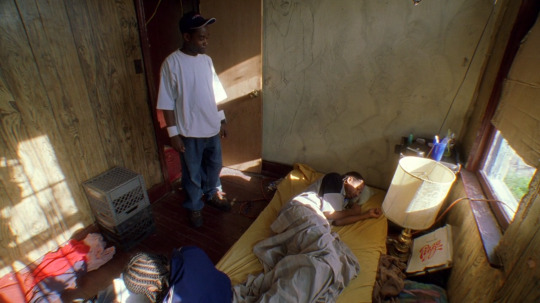
The Wire, “Lessons”
I
“Sick of the Sun” is one of Poppy’s most personal songs. It’s also one of her prettiest. Like nearly all vocals these days, Poppy’s voice is adjusted in production, and sometimes quite heavily. This means that you’ll never hear a Poppy song with vocal blemishes, but sometimes the heavy adjustments smooth out all the “personality” in her voice. In “Sick of the Sun,” however, Poppy and co. hit a sweet spot; Poppy’s voice comes out sounding quite pleasant, beautiful, even, right up there with the choruses on “Fill the Crown.” It probably makes sense not to over-produce the vocals in SotS. After all, if you are producing a more “personal” song, you would want to preserve the distinct tone of the vocals to maximize its “authentic” sound.
“Sick of the Sun” (SotS) also features one of the cleanest and catchiest vocal melodies Poppy has ever written, right up there with the ones in “I Disagree.” I’m laying on the praise pretty thick here because, well, I kinda like the song. That being said, I would still like to share some criticisms of the song. Throughout I Disagree (album), we can see Poppy experimenting with different ways of closing out tracks (see: literally every song on the album). But in the case of SotS, there’s a really strange male-dominated vocal harmony right at the end of the song. Sure, there’s some harmonizing throughout the song, but this snippet really springs out of nowhere. Perhaps it was intended to serve as a transition to “Don’t Go Outside,” but instead it comes off as a little dissonant with the rest of SotS. Further, including someone else’s voice at the end slightly undercuts the song’s personal feel. Maybe this could have been avoided had this ending been retracted or altered. SotS clearly has a strong sense of “tiredness” or “fatigue” to it, so perhaps a prolonged ‘sigh’ out of Poppy would have been a more harmonious close to the track. A final ‘sigh’ would also serve as a better transition to “Don’t Go Outside” as it would situate Poppy at a “low-point” of sorts that she would then “rise out of” in DGO. I also think placing “Sit/Stay” right before SotS would be a good choice. “Bite Your Teeth” isn’t overly related to SotS, whereas “Sit/Stay” is. Both SotS and “Sit/Stay” explore some of Poppy’s personal frustrations; “Sit/Stay” does so in a loud, vehement way, whereas SotS does so in a quiet, reserved way. In a sense, both tracks are two sides of the same proverbial coin. Of course, swapping the order of songs on an album isn’t always simple; sometimes albums are put together in a very specific way for a reason. So, moving “Sit/Stay” begs the question of where “Bite Your Teeth” should go. I’m not sure about that one. I’ll have to try listening to the album in a couple different orders first. Plus, there’s always the chance I’ve missed something. In fact, I think it’s likely.
II
Now, it may seem strange for me to talk about SotS since, well, most people seem to have a pretty decent grasp as to what it’s about. Or, at least, that was my initial impression. Upon closer inspection, however, it appears that the predominant interpretation of SotS (AKA the one I found on Genius and want to yell about) is specious at best. Obviously, the Genius interpretations are written by different people who don’t necessarily agree on all the details, but there is a common thread throughout the site’s speculations: that fundamentally, SotS is about Poppy reflecting on a time when she dealt with depression.
This view seems plausible at first, especially when considering lines such as “Everyone told me that it would get better/ But every day feels exactly the same.” Seems to fit well, yes? Well, it doesn’t. actually. I’d like to demonstrate just why the “depression” interpretation of SotS is not only inaccurate, but it’s also a logically nonsensical construal of the lyrics. Quite a claim, but I’ll explain. Before I do so, though, I’d like to get my disclaimers out of the way. By no means do I seek to diminish the importance of mental health, nor do I seek to undermine the experiences of those who’ve grappled with problems to theirs. My thoughts on our modern mental health epidemic are complicated, and probably not-too-coherent either, though I’m sympathetic to more postmodern claims that it’s really weird to simply treat people with mental health problems as though their brains are just “not working right,” especially without asking why? What caused them to be this way? and further, that holy shit there is a lot of vested interest on the half of [various others] to not examine the many root causes of our mental health predicament. Plus, what does it mean for someone’s brain to be “not working right”? According to whom? For what? And I’m just scratching the surface. Merely hinting at the surface, in fact. But of course, that’s another, far scarier, discussion, so I’ll just say: as someone who hasn’t exactly had pristine mental health: yeah, depression et al. fucking suck. And so, I’ll definitely admit that depression does seem to be a common motif in music these days, it’s just not a common motif in Poppy’s, and so it’s probably not in SotS either. Now, my reasons why this is:
First, it seems rather strange to declare that SotS is about “depression” given the fact that Poppy has never talked about experiencing any form of mental “illness.” No, seriously. Now before the non-intentionalists write a hit-piece, I’m merely pointing out it’s a little inappropriate to diagnose a former-pop-star with depression (through her music, no less!), especially when she has never even talked about it. But this does beg the question: how’d we get to thinking SotS is about depression? Well:
Second, it appears that the depression interpretation is based on a fundamental misunderstanding of the tone of SotS. Listen to the song again. Is this what “depression” sounds like? Surely the tone is a little down-beat, but it’s not that down-beat. Tired, perhaps. Fatigued, even, but surely not depressed. Maybe a tinge of sadness is present, but the song is saturated with instrumentals that give it a very light and dreamy feel. Psychedelic, even. Wispy. Distant, especially. All these words I would use to describe the sound of SotS, but “depression” I would not.
Third, and perhaps most damning, is that the depression interpretation is completely nonsensical. This isn’t merely a cheap-shot or a jab—I mean that the depression interpretation is actually logically incoherent. Look, everyone can agree that Poppy’s lyrics (and videos, etc.) tend to be on the cryptic side. Thus, your first impression of what a song or any other work of hers is about may be wrong. In fact, it may be likely. See, for example, “Me Laughing.” Further, it seems that a lot of the “interpretations” you find on Genius tend to be on the shallower side, AKA, they tend to be “first impressions” that aren’t thought through all that well. Not to say Genius contains nothing of value, because it may, but the explanations it gives are usually quick answers so people scratching their heads at lyrics can quickly look and say “yep, good enough!” And this leads to, among other things, mistakes. Some of which are bad, even.
Let’s take an example. The eight-line chorus of SotS is as follows:
I'm sick of the sun
It burns everyone
I want it to go away
I just wanna float away
I'm sick of the sun
Can't trust anyone
I want it to go away
I just wanna float away
Cool, so that’s what we’re looking at. Now, the Genius interpretation of the chorus reads as follows:
Whilst this can be interpreted in several ways, these lyrics can be perceived to be Poppy / Moriah’s struggles with depression. Clinical depression, a common mental illness, is often accompanied by self-isolation: people often don’t have the energy to leave their house.
The sun is often a metaphor for hope and the fact that Poppy is sick of it indicates the presence of despair. “I want it to go away” can be seen as a desperate plea of a woman against her mental illness. She wants to be rid of it.
The final line can be seen as even darker. Whilst “floating way” brings about gentle, sweet connotations, in this context it can indicate death or perhaps even suicide, e.g. the spirit floating away from the body, floating away from reality.
The distrust present in these lyrics may also refer back to Poppy’s self-isolation. She feels as if she can no longer connect with anyone.
Source
Emphasis mine. Okay, I don’t wish any personal harm on the author of this explanation, or the twenty-five people who upvoted it, but my god, this is an absolute trainwreck. To show why this is so terrible, we’ll look at the bolded section closely:
“The sun is often a metaphor for hope”
Okay, sure.
“and the fact that Poppy is sick of it indicates the presence of despair.”
Not really. Despair indicates a lack of hope, not a disdain of hope. But I’m being a little pedantic. The real problem comes next:
““I want it to go away” can be seen as a desperate plea of a woman against her mental illness.”
Did you catch that? The word “it” has completely forgotten what it was referring to. It’s downright lost its referent. As a reminder, the chorus reads like:
I'm sick of the sun
It burns everyone
I want it to go away
so when Poppy says “I want it to go away,” she means “I want [the sun] to go away,” not “I want [my depression] to go away,” as this person would have us believe. Besides, it was just established that the “sun” was a metaphor for “hope.” So how could someone wanting “hope” to “go away” possibly be “a desperate plea of a woman against her mental illness”? Wouldn’t a “desperate plea against … mental illness” be seeking “hope” and not wishing it away?
Look, I’m not saying the song can’t be about depression, it’s just that all the explanations we have, including the one above, that support this idea are truly awful. I think we should have much more evidence before we recklessly go about diagnosing people with mental conditions by listening to their songs.
Fourth, as alluded to, the view that SotS is about depression fails to account for several important lines in the song. Interestingly, these lines seem contradictory to the idea that the song is about depression. For one, our [G]enius interpreter completely ignored the line “It burns everyone.” Probably because this line doesn’t fit neatly into the interpretation of “the sun” representing “hope.” After all, it’s not clear that “[hope] burns everyone.” In fact, it seems like nonsense. Plus, we’re not sure how the line “Can’t trust anyone” fits with Poppy’s alleged depressive episode. Huh, I wasn’t aware that paranoia was a key feature of depression. Guess we’ve got some news to break to the tin-hatters. Further, if SotS is about depression, then what’s with all the talk about Poppy needing to “find the right sound”? Even Genius appears to give up connecting this to depression. It seems that either a) these four lines don’t connect with the meaning of the song and Poppy was mistaken to include them, or b) SotS isn’t about depression. I’ll opt for the latter. Look, I’ve been railing a little hard here, so I’ll say that it’s fine if your interpretations miss a few bits (as mine usually do). Just know that leaving about important pieces of information, especially pieces that fly directly in the face of your interpretation, means you’re no longer interpreting [the piece], but instead you’re interpreting a conveniently-warped-caricature-of [the piece]. By doing this, you’re no longer engaging with the piece on its terms, but your own. You’re not attempting to “discover” the meaning of the work, instead you are projecting on your own and throwing out the bits that don’t conform. At the risk of angering [a lot of people], I find it a tad unhealthy to treat artworks merely as devices to either a) confirm what you already “know” or b) be thrown out for being “wrong.” As an olive branch, perhaps “some'' projection is inevitable, but we can at least admit degrees. And an even bigger olive branch: I used to do a) a lot (and still somewhat do).
Fifth, I’m deeply suspicious of the modern instinctual association of “sadness” with “depression” and “solitude” with “something is wrong with you.” Who taught us to do this? Where did these associations come from? Most worrying: who/what wants us to think this way? This may seem contradictory to what I said before. No. Yes. I don’t know. I haven’t written about mental health, and I don’t think I can. So with that, let’s move on.
Regardless of whether you find all five of my complaints tenable, hopefully they were enough to convince you that this idea of SotS being “about Poppy’s past depression” needs to be buried. Preferably six feet deep.
III
Okay, so if SotS isn’t about “depression,” then what is it about? Well, let’s take a look at some of the lyrics. The song opens with the refrain, headed by the line “I’m sick of the sun.” We may ask: what is Poppy referring to as “the sun”? Does she mean this literally, as in, she is tired of the warm glowy ball of fire in the sky? Or is she talking about something else here? It seems that this analogy is a central part of the piece. By this, I mean that this analogy recurs throughout and is deeply embedded in the song. Hence, one’s answer to the above questions will influence the rest of the song’s meaning. Knowing this, perhaps we should look at some of the other lines before we take a guess.
Immediately following “I’m sick of the sun” comes the line “it burns everyone.” Hm. The literal sun is rather hot, but does it really burn “everyone”? I don’t think so. Plenty of people go their lives without sunburns, or simply minor ones. It also doesn’t seem like the literal interpretation of “sun” here would explain the inevitability of being “burned” that this line seems to suggest. Indeed, the next two lines (“I want it to go away/ I just wanna float away”) point towards Poppy dealing with some sort of personal trouble, rather than her disdain of fiery yellow dwarves (I feel like there’s a joke there). This notion of personal trouble is also supported by the other line in the refrain, “Can’t trust anyone.” Okay, perhaps we can do away with the literal interpretation of “the sun,” but then what is Poppy speaking of?
We turn now to the verse. SotS has only one, eight lines in total. Typically, the verses in a song are enough to tell listeners what exactly is going on, but a cursory glance at this lonely verse casts doubt upon its explanatory capability. It doesn’t even appear that the verse covers all that much ground, so to speak. Are we then stuck in the dark, or is this single set of lines really enough for us to ascribe some coherent meaning to the song? Well, yes, actually (ambiguity intended). Close inspection reveals that the verse contains plenty of information—more than enough to guide us through the rest of the song.
Let’s proceed in true analytic fashion by breaking the verse down into two sections, each four lines in length. This break isn’t simply for the sake of symmetry, but is instead based on subject matter. The first four lines of the verse (“Can someone turn the lights down?/ … / Someone turn the lights out, oh”) pertain to Poppy’s aversion to “lights” whereas the subsequent four lines (“I need to find the right sound/ … / [ditto]”) pertain to Poppy’s struggle to find her right “sound.” I’m slightly trivializing this difference, but as we shall see, the distinction is not merely formal.
The first part of the verse, the “lights” bloc, contains several key bits of information. As noted above, these four lines are concerned with “lights” of some sort. But what do “lights” have to do with our central analogy pertaining to “the sun”? Well, “the sun” is clearly a type of light. A very bright one, in fact. It may even be that “the sun” serves as simply an amalgamation of the “lights” mentioned here. I suppose this would hold true literally if you’d like to consider the sun a collection of nuclear reactions, but, science aside, there does seem to be a more metaphorical marriage of “lights” with “the sun” from the words “‘cause it’s too bright.” Here “it’s” does a lot of work; the tinge of vagueness serves to connect the prior two lines, which contain requests for someone to “turn the lights down” or “shut [them] out,” with “the sun,” by saying that “it’s too bright.” Now how does Poppy respond to “the lights”? Well, she says: “I close my eyes.” Note that closing one’s eyes alleviates the pain from bright lights, similar to how one does after waking up and looking outside on a sunny day, but it also leaves one blind, temporarily unable to take in any outside information.
Present also in the “lights” bloc are requests for “someone.” “Someone” to somehow deal with these “lights,” either by turning them down, shutting them out, or simply turning them out. Who, exactly, is to be this “someone”? Well, perhaps nobody, and it’s possible that Poppy’s almost disinterested tone here shows she is aware of this. This may be some sort of acknowledged bystander effect: nobody is actually going to deal with these “lights”—maybe nobody can. Notice there is also a shift in the intensity of Poppy’s requests to this “someone.” She starts asking for “someone” to “turn the lights down,” then asks for “someone” to “shut the lights out,” before finally asking for “someone” to “turn the lights out” altogether. Maybe Poppy is finding herself increasingly ‘fed up’ with “the lights” over time, or that “the lights” are becoming increasingly disruptive to her. But disruptive how? Indeed:
The final tidbit from the “lights” bloc is that Poppy mentions “the lights” are “too bright”? But “too bright” for what? We’ve already agreed we’re not being literal here, meaning this isn’t a simple case of caring for one’s retinas, so why are these “lights” such a problem? Well, perhaps the next part of the verse can provide an answer.
The next section of the only verse may be called the “sound” bloc for convenience. The first and last line (fifth and eighth in the whole verse), “I need to find the right sound,” tells us about the nature of Poppy’s troubles in SotS. As many know, Poppy has recently been changing up her “sound,” notably from pop to [something media outlets struggle to characterize]. It’s interesting that Poppy mentions she still hasn’t “found” “the right sound,” even after switching up her style. Perhaps more surprises are to come. Or, perhaps, she is referring to past struggles. Either way, in the next line she wishes for her “right sound” to be “Something [she] can say that [she] found.” The struggle for individuality is a common motif in Poppy’s work, in both her past work and present. It seems that even after changing her sound to something more true to herself, she found that her personal struggle to distinguish herself from others (or remain true to herself) persists. The next line, “Yeah, I can hear it in my mind” tells us that Poppy has some conception of the “right sound” for herself, but it’s on the tip of her tongue, so to speak. Combined with the repetition of “I need to find the right sound” at the end of this bloc, we’re given some sense of the difficulty, perhaps even impossibility (not futility, though) of doing so. It could be that this “right sound” is something that constantly eludes Poppy. After all, “the right sound” probably changes as she does, which would make actually “finding” it rather tough.
The common thread through the “sound” bloc is Poppy’s artistic struggle. Her struggle to produce something that is original yet remains true to herself. Plus, whatever “sound” she produces needs to be something people want to hear. No small feat. Thus, we find an answer to our previous question (“too bright” for what?): it seems that “the lights” and perhaps “the sun” are interfering with Poppy’s creative process and are hampering her pursuit of individuality she strives to achieve through her work.
The only other set of lines (the bridge, apparently) that differs from the chorus is as follows:
Everyone told me that it would get better
But every day feels exactly the same
As previously mentioned, this set of lines does lend itself particularly well to the depression account, but it may just as easily be thought of referencing Poppy’s difficulties finding a “sound” that is both true to herself, original, and something people actually want to hear. However, there is also a tie-in to Poppy’s previous attempts to rid herself of “the lights” or “the sun.” Meaning: something’s still missing here. As such, it seems that providing an explanation of the song’s central analogy (what is “the sun” referring to?) is now necessary, but, since we have looked through the song in detail, providing such an explanation is also now possible.
IV
We’re left with a final riddle of sorts: what “burns everyone,” causes distrust (“Can’t trust anyone”), pervades, persists, and interferes with one’s creative process that Poppy wishes to untether herself from (“I just wanna float away”)? Indeed, what is “the sun” here?
The previous and seemingly common answer was “depression,” but as we demonstrated, this explanation is rather lackluster. Thus, I would like to offer my own: “the sun” is an analogy for “the Spotlight,” the ever-present gaze of fans, friends, and foes on the life of the famous. How does this new explanation fare? Can it help us ‘tie things up?’ Let’s test it out and see:
Suppose that when Poppy says she is “sick of the sun,” she means she is “sick of the [Spotlight].” She is tired of always being watched and always being scrutinized (“I want it to go away”) and she wishes to unplug or untether herself from The Game all famous artists play (“I just wanna float away”) because it causes her stress or strife (“It burns everyone”) and she finds it has corrupted some (or nearly all) of the other players (“Can’t trust anyone”). In fact, she finds that the Spotlight interferes with her own personal quest to create work that remains both true to herself and original (“Can someone turn the lights down?/ … / I need to find the right sound”). Unfortunately, it appears that life in the Spotlight is not something that will simply “get better” on its own (“But every day feels exactly the same”). Sometimes, just to manage, Poppy finds the need to disconnect for a while (“I close my eyes, ‘cause it’s too bright”).
Hey, that’s not too bad. I’d even go so far as to say it’s a little “better.” Indeed, the “depression” account, which, honestly, doesn’t account for much, relies heavily on just a couple lines and plenty of armchair psychology, whereas the “Spotlight” interpretation offers a far more “decentralized” explanation of SotS. Plus, the “Spotlight” account views SotS as consistent with much of Poppy’s previous work and with external information about both her recent change of sound and her frustrations working within the competitive and conformist music industry; the “depression” account treats SotS as Poppy’s offshoot confessional on her mental health, something that she has seemingly never acknowledged elsewhere.
Look, I’m not advocating writing an essay every time you hear a song you like. I’m also not saying you ‘must’ see things the way I do. After all, “meaning” doesn’t come out of thin air—we are the ones who put it [everywhere]. So, fundamentally, all I can do is make an argument. I just want to show that we can [interpret/analyze/evaluate/whatever] “better” than we currently are. I know we can. Hell, I’ve even seen it done. That’s why I’m so tired of Genius’s “explanations” of songs explaining away all the genius. I guess you could say I’m “sick” of them.
...
...
...
*Sigh*
0 notes
Text
Scary Mask
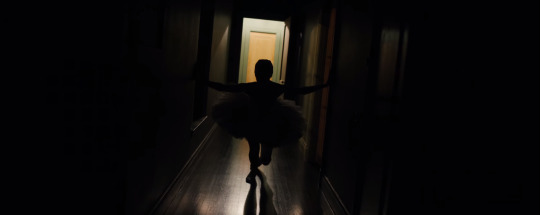
I.
I don’t know what to say when people come apart
The road is long, the road is dark
And these are just the words to somebody else’s song
Before I get into it, I’d like to quickly note that this is not best post to start with. Same goes for the one on “Me Laughing.” My older posts are much friendlier reads and not nearly as dense.
Okay, let’s go.
At first I thought “Scary Mask” was straightforward, i.e. Poppy uses her persona (“I wear my scary mask”) as a defense when she finds herself in uncomfortable situations (“when I’m afraid I don’t belong”). “Well that was anticlimactic.” Indeed. But, of course, this is Poppy we are talking about, and nothing with Poppy is quite so simple.
The problem with basic interpretations that sum up a song with single sentence is that such readings miss all the nuances of the work, i.e., they leave out all the fun little twists in the lyrics, the double-meanings in the lines, etc. Basically, simplistic interpretations of lyrics ignore all the poetry, which is part of what allows music to transcend language. Poetic lyrics also provide us with new pieces of language so that we can better understand the increasingly complex world around us. Nestled in the gaps between our definitions lies the inexpressible that only poetry can render sensible.
Well-written (read: poetic) lyrics are part of what allows songs to completely baffle us; they allow songs to elude simple characterization and slip the shackles of obsessive categorization (e.g., genre). A truly great piece of music leaves us speechless; we cannot simply explain it to someone. Instead, the best we can do is say, “you know what? Just listen to this,” to which they are only able to reply, “wow… you’re right.”
This is why I love metaphors and dualities. Yes, I realize the previous sentence just caused every person who hated English in school to audibly cringe. Look, I’ve been there, I get it. I used to think English was a cruel joke played at everyone’s expense and that it was stupid because ‘there is no right answer.’ Then one day, all of that changed. Almost as though a switch was suddenly flicked ‘on’ in my brain. It wasn’t until I understood English that I finally appreciated it. I’ve never wanted to go back, so hear me out.
Metaphors are essentially a way of controlling the associations formed by your brain when you read or hear a word. They can make you associate simple pieces of language with something extraordinary, and make you see things in a way you would never have previously considered.
If you’d like to get fancy, you can start introducing dualities; that is, setting two concepts on opposing ends of a spectrum. When you do so, you allow the reader to consider new and (seemingly) impossible gradations, all born from the struggle between two relatively ordinary ideas.
Take, for example, Poppy’s ‘poetry-ecstasy’ duality that she introduced in “X.” This was the first thing that made me take a more serious look at her work, i.e., “I think something else is going on here…” We know poetry and ecstasy are meant to be diametrically opposed in “X” because the colors in the music video change in sync with Poppy’s delivery.

If YouTube subtitles weren’t broken, they would read: “poetry, poetry, poetry”

Likewise: “ecstasy, ecstasy, ecstasy”
It’s not obvious that poetry is the opposite of ecstasy unless you’re in Wonderland in which case, you messed up somewhere. Moving on, when you set two concepts against each other like that, you introduce a new interplay between the two ideas. Now the audience is forced to see things from a new perspective, one they would not have otherwise considered. Or, they just ignore it, as is usually the case, but I digress.
With all this in mind, further study into “Scary Mask” reveals that some parts of the more basic reading don’t quite add up. Take, for example, lines like, “M-A-S-K, am I okay?” or “You ain’t gonna see me tonight”; these lines refuse to fit neatly into the obvious interpretation e.g., why spell out ‘mask’? Why are [they] not going to see “you” “tonight?” Most people would choose to ignore these outliers or simply shrug and go about their day. If this post’s existence didn’t clue you in, we won’t be doing much ‘shrugging’ or ‘ignoring.’
You’ve probably noticed this already, but I try to forge readings of Poppy’s work that fit as many different pieces as possible into them. To craft interpretations that capture the interplay between all the elements in a song. Often, this requires approaching the song from multiple angles, some even being right. If this post is good, each interpretation should form its own colored shard of glass, leaving the reader with a beautiful explanative mosaic. If this post is bad, grab a broom and wear shoes for a week.
Hilariously, doing justice to the more abstract bits of art usually means I have to use figurative language to explain other figurative language. “Sounds meta.” Indeed. Some puzzles can only be done justice with other puzzles, which is also why my writing frequently dips into obscurity. Close reading yields wonders, but means interpreting ‘carefully’ and ‘openly.’ “Sounds like a lot of work.” It is, but anybody can come up with a vague idea of what a song is ‘about,’ e.g., “this one’s about love!” How insightful, you should post that on Genius, that’s just what they’re looking for. I mean, really, at that point what are you even getting out of the song? A few minutes of pleasure before you move onto the next one? Is that it? Are you going to just spend your entire life constantly devouring one helping after another, waiting hungrily for your favorite artists to dish up your next meal?
I may be going to hell, but at least I won’t be stuck doing that.
II.
Rise and shine—
get out of bed!
Take my hand,
there’s darkness ahead.
“Scary Mask” is one of Poppy’s best songs. No, I’m not interested in arguing about this. It is also one of Poppy’s most important songs. This, however, I am interested in arguing about.
For the sake of the following discussion, I will be ignoring most of Poppy’s singles. “Metal” and “Immature Couture” and [other singles] are good but they complicate things and I don’t have time to deal with them, despite having the time to tell you how little time I have. Fancy people would probably call such exclusions “exceptionally non-rigorous,” but I’m over it.
I tried to make this section not-boring, dunno if I was successful; my writing takes on the flavor of whoever I read last, hence why the “Me Laughing” post reads like schizophrenia. Lately, I’ve been feeling especially masochistic, so I’ve been reading [redacted]. Expect that to shine through.
Let’s zoom out for a bit: “Scary Mask” is the flagship song of Poppy’s Choke EP, though I am sympathetic to arguments for “Meat.” “Scary Mask” ties the whole EP together and makes it possible. It’s critical to Choke’s ‘flow.’ This isn’t a given, I’ll explain/pretend to explain.
The structure of Choke almost perfectly mimics that of a five-act play. Yeah, like that Shakespeare guy. The EP contains exposition, rising action, a climax, falling action, and a conclusion. The methodically squeezing “Choke” sets the mood and introduces a problem statement to color the rest of the EP. With its pendulum-like bassline and hypnotizing array of voices, “Voicemail” depicts a forsaken mind becoming further and further dissociated from reality. A complete breakdown occurs in “Scary Mask,” the explosive climax of the EP and, at least so far, Poppy's work. Following “Scary Mask” comes the bleak and gruesome “Meat,” which is clearly akin to the falling action. And finally, we are given “The Holy Mountain,” the EP’s pessimistic and wistful send-off.
As for the context in which “Scary Mask” was created, Choke comes after two pop-y records, Bubblebath and poppy.computer, and a half-pop, half-??? disc, Am I A Girl. After AIAG, Poppy had a choice: back off and return to pop or double-down and bring on the metal. Thankfully, she chose the latter and made Choke. Let’s all take a minute to praise AIAG for even allowing Poppy such options, for flowing together so smoothly, etc. Okay, séance over, let’s return: “Scary Mask” carried Choke, without it, the EP would’ve been severely lacking a massive, stand-out song to serve as the EP’s creative apex.
“Scary Mask” is, in a sense, the ‘no turning back’ point for Poppy. Producing “Scary Mask” was like Poppy locking her old style away and throwing out the key; “X” and “Play Destroy” were #wild, but “Scary Mask” was the third strike. Put confusingly, “Scary Mask” was Poppy’s ‘home run’ while also being the ‘final nail in the coffin’ and other idioms. The track is so far removed from the days of Bubblebath and P.C that it actually created a distance, a gap, between nu-Poppy and Pop-y. “X” has pop elements and Poppy cutely ‘ooo-ing’; it was walk back-able. “Scary Mask” has Jason Butler demonically screaming and saying the ‘fuck’ word; fine print says “no refunds.” Or, if you’d prefer analogies that are unlikely to age well: think of a giant iceberg breaking off from the main Arctic glacier and slipping into the cold, dark sea. Once it’s off, it’s not freezing back on. In other words, once Poppy dropped “Scary Mask,” ‘princess with a pistol’ became ‘demonic metal queen.’
I’ll also argue that “Scary Mask” is the least compromising song in Poppy’s current discography. It’s her truest expression of self pre-I Disagree. All artists have to make their music listenable-enough to get bread, just like I need to make my writing readable-enough to get read. Unfortunately, compromise is inevitable, but artists can still create good music. It’s just hard and getting harder. Plus, nobody agrees what ‘good music’ even means because we have no rigorous definition for art so—
When an artist decides to really ‘go for it,’ to make no compromises, and does it well, a beautiful thing happens. That’s what “Scary Mask” is for Poppy; she decided to pull no punches, and the result was, well, “Scary Mask.”
“X” and “Play Destroy” were both successful, but they didn’t guarantee Poppy’s nu-success. “Play Destroy” had Grimes, and “X” could have been an anomaly. If Poppy went back to pop, fans could have passed off her dip into metal as ‘weird’ but ‘kinda cool’ and that would be that. However, Poppy didn’t let up—“Scary Mask” proved she could consistently make quality metal tracks, and now we’re here and Poppy is about to destroy the world or something. Nice.
In summary: “Scary Mask” functions to transition Poppy’s sound, it does a damn good job of it, and I’m definitely looking forward to her new album.
III.
You try to take the best of me
Go away
You try to take the best of me
Go away
Alright, zoom back in. Yes, “Scary Mask” made it possible for Poppy to throw in crazy distorted guitars and for everyone to love it, but it does more than that. “Scary Mask” also transitions Poppy her(?)self, which sounds strange but it will make sense later, probably.
Now time for the fun part.
Sometimes I like to begin my analysis with a song's verses before circling back to the chorus, as was the case with "The Holy Mountain," however, "Scary Mask" is so crazy that it doesn't even matter where I start. It's what I lovingly refer to as “straight-up bonkers,” like some twisted monstrosity tearing its face off as it stumbles around in the dark. Reminds me of the psychos from Borderlands, an analogy that already has not aged well. Basically, “Scary Mask” is all over the place, so I might as well start from the ‘beginning.’ I'm going to have to pick up the pieces and stitch them into some monster that would do Mary Shelley proud anyway.
Let's dive in.
Poppy opens the song with: “I wear my scary mask when I'm afraid I don't belong.” Okay, seems pretty straightforward so far. There isn’t much to work with here, but maybe we can add some color to this line. BUILD series conducted a relatively listenable interview with Poppy earlier this year. One excerpt to note:
Interview: “Well, why wear a mask?”
Poppy: “Sometimes you just have two faces.”
Interview: “And that’s okay?”
Poppy: “Only sometimes.”
This is why I was debating just skipping “Scary Mask”—the opening line was a little cliché, and it seemed like Poppy had taken Batman Forever literally, neither of which are particularly good signs. However, I want to stress that lacking an interesting message wouldn’t necessarily make “Scary Mask” a ‘bad’ song. This idea may seem very strange, especially in modern society where it appears everyone agrees that deep themes=good art. We’ve been raised with the notion that the best art is art that tells a message, and it’s difficult for us to consider otherwise. However, not only does the conception of ‘depth’ quickly fall apart (as I noted in the “Me Laughing” post), but it’s entirely possible that thematic elements have absolutely zero bearing on the aesthetic quality of a work. In other words, ‘themes’ may not be what make art ‘good.’
Yeah, take a minute and think about that.
Anywho, after deciding I could afford to pay attention, I found many interesting things. Note Poppy’s word-choice. She uses the word “scary,” an almost child-like characterization of something fearful. Indeed, in the music video, Poppy’s hair is hidden or pulled back, giving her a youthful appearance. Look, pictures:


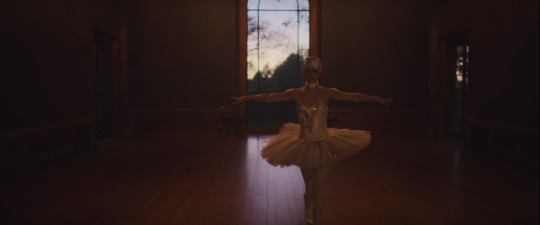
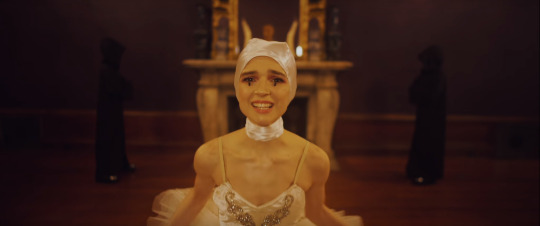
Moreover, peppered throughout the song are Poppy’s pouty squeals and she sings with call an almost ‘whimper-y’ tone, the end of her words marked by a spike in pitch. Obviously, we’d like to ask: why is she presenting herself to us this way?
We find answers in the second half of the line: “when I’m afraid I don’t belong.” Okay, so when she finds herself in situations where she is uncomfortable, where she is struck by the feeling of being small, almost child-like, she resorts to the mask as a defense mechanism. Now we’re getting somewhere, though I would like to ask: why is the mask “scary”?
Being two-faced does not necessarily mean the one face has to resemble Harvey Dent post-toasting, it could simply be a different side of your personality. Perhaps the next line will help:
You can’t read my brain until it’s off
Note Poppy says “brain” instead of any other word such as ‘mind’ or ‘thoughts.’ Using the word ‘brain’ signals a sense of invasiveness. Think: Sylar from Heroes cutting open peoples’ skulls and studying their brains for secrets. I’m sure many obsessive fans have tried digging up details on Poppy’s personal life and many interviewers have tried asking her inappropriate questions. It appears that Poppy wears a “scary mask” as a counter to such intrusions, as if she decided that the only appropriate response to these inappropriate behaviors was a face-to-face with the scary mask.
Holy shit, was this entire song written as a response to the AMP Radio interview? That would be hilarious.
Poppy then repeats that the mask is “not coming off.” Hey, wait a minute…
Okay, so after a fairly badass guitar interlude, Poppy begins feverishly chanting the lines: “I'm never gonna take it off, so don't touch me / Never gonna take it off, stop looking at me.” I’m sure some fans hate me because I’m always banging the drum that Poppy’s work is about obsession, and thus, appear to be attacking them, but come on, how clear would you like the message to be? Go watch “Repeat After Me” if you’re not convinced.
Anyway, in a sense, Poppy’s scary mask (read: freaky persona) operates as a shield from foreign bodies who seek to violate her personal space.
I’m going to leave Jason Butler’s lines for the end because, well, you’ll see.
IV.

In the music video for “Scary Mask,” after Poppy first puts the mask on and has a little breakdown, there are many instances where she is no longer wearing the mask, but is still acting like a possessed teen in desperate need of exorcizing. This is weird, here are some possibilities:
1) Poppy takes the mask off in the music video because she’s pretty and people want to see her lip-syncing.
2) The mask was always on.
We’re going with door #2.
Let’s look at some of the weirder lines, like Poppy chanting the incantation: “M-A-S-K, am I okay?” By spelling out ‘mask,’ Poppy signifies that the “am I okay?” question is directly referencing the mask she wears. In other words: is it okay for Poppy to wear a mask?
We already know Poppy came down pretty hard on one side of the fence when she answered “sometimes” in the BUILD series interview. My equally unambiguous answer is: “it depends.” There are many reasons why wearing a ‘mask’ is a terrible thing that slowly renders you psychologically ‘fucked,’ go read TLP or Lasch if you want more info on that (actually, you should just read them anyway). However, we’ve already established “Scary Mask” was an empowering song for Poppy because it served as a truer artistic outlet for her, so any masquerading should be approached with this in mind.
Alright, so when is it a good thing to wear a mask? How can it be a good thing to pretend to be someone you’re not?
Well, when you’re an artist, you typically create art to express something. Often, this ‘something’ is deeply personal to yourself. You put a lot of yourself into your work. This means criticism of your work can really hurt. After all, if someone calls your [song/painting/writing] ‘trash,’ it’s like calling you ‘trash.’ It feels like that criticism is aimed directly at that piece of yourself you put into your work. Yeah, that sucks. Sometimes it’s so difficult to bear that you avoid creating anything so you don’t have to be faced with such attacks. You forgo creating art because the injurious potential of criticism is too daunting. Without a creative outlet, your feelings remain bottled inside, slowly eating away at you from within. It’s a lose-lose game and everyone’s the player.
So, you ask: “what do I do?”
Well, that’s where the mask comes in.
The artist can use a persona to get around these problems. In other words, putting on a mask can actually allow you to finally be yourself, which seems paradoxical, but I’ll explain.
Take, for example, me. After reading enough of the silly words I write, you may start to form a picture of me in your head. To speculate and fantasize about what I actually look like or how I actually act. Without even knowing your thoughts, I can assure you that any such conceptions are completely inaccurate. I know that I’m not actually as [adjective] as you imagine me to be because I work with a protective persona. The persona allows me to write without worrying too much harsh criticism. Hence, with a persona, I can safely express myself through my work.
The same is true for Poppy. As I’ve noted in previous posts, Poppy has a lot to say about the world. She would like to express these messages artistically, but it’s not always easy to face criticism of her work (and Poppy gets a lot of hate). By adopting the ‘Poppy’ persona, Poppy is able to safely express herself. To finally say what she wants to say. To be who she really wants to be. And when she is faced with scathing criticism, she is able to continue her work undeterred because it feels like the criticism is directed toward Poppy (persona) instead of Poppy (person).
An alternate (and hilarious) reading of the lines “M-A-S-K, am I okay?” and “I’m alright, I’m alright, I’m alright” would be to imagine them as part of a demented question-and-answer period with Poppy. Many of her fans have expressed concerns over the effects of living your life pretending to be a [robot/alien/demonic angel], not to mention the section of Poppy’s fan-base who seem to constantly worry about Poppy being Titanic’s so-called ‘puppet’ and that he is abusive towards her. You can interpret Jason Butler screaming “I’m alright, I’m alright, I’m alright” as Poppy’s response to such concerns. Seems like an appropriate answer to me.
V.
You try to take the best of me
GO AWAY
YOU TRY TO TAKE THE BEST OF ME
GO AWAY
YOU TRY TO TAKE THE BEST OF ME
GO AWAY
There are some remarkably odd lines in “Scary Mask” that need some serious groundwork to render sensible, so let’s switch gears for a second and complain about pop music. Yes, I know. It’s not exactly brave (let alone novel) to decry pop music as a vapid and soulless caricature of art, but I find it therapeutic. Plus, I’m clearly writing a narrative here. If these words make you indignant, first ask yourself ‘why?’ and then relax. I listen to pop music too, most of which is terrible. Also, I’m talking about the correlation, not the rule. If you fight me with exceptions, I’ll hit you back with trends.
Pop is the most apologetic music genre out there (though mumble rap and country are giving it a run for its money, literally); pop music’s main purpose is stated by its terminology: it exists to be popular. To be as widely palatable as possible so as to garner as many listeners as possible. The implications associated with a genre revolving entirely around popularity for the sake of commercial success are pretty disgusting. I’d even go so far as to say the existence of ‘pop’ as a musical genre is a strong indicator that culture is no longer treated as an essential component to human society, but is instead only another industry, and has been for a while. People love celebrating the façade or appearance of culture (partially so they can consider themselves ‘cultured’), but the truth is that culture now exists mainly as a commodity to be endlessly repackaged and sold back to people under the guise of ‘art.’ “I blame capitalism!” Sure, and you may not even be wrong, but that’s a discussion for another time. The point here is that to successfully create music with value, music that isn’t just a meaningless product, one needs to escape such a hyper-commoditized regime i.e., the corporatized pop-music industry.
Business-wise, Poppy did this by ditching Mad Decent and signing with Sumerian Records, an independent label which will hopefully make her very happy. Music-wise, she also had to transition. Recall: putting on the mask (read: persona) allowed Poppy to be herself and make the music she wanted to. So, to evolve her music, she had to also evolve the mask. After releasing two and a half pop records, people will generally expect, well, more pop. People don’t like when their favorite artists abruptly change, probably because they don’t wish to face the idea that said artists were never making music for them in the first place. Either way, for Poppy to tell tales of an impending apocalypse or drop an insane metal album like I Disagree, she had to ease fans into it. Musically, this is the second half of AIAG and the entirety of Choke, but it’s also a perfect encapsulation of “Scary Mask.” It’s possible that the bipolar nature of songs like “X,” “Concrete,” and “Scary Mask” is only due to Poppy trying to transition her sound without upsetting too many fans. Hence why these songs incorporate lighter sections to balance out the darkness. Perhaps “I Disagree” is as dark as Poppy’s going to get, but given recent news of her hanging out with Nadya Tolokno from Pussy Riot, I doubt it (“don’t know how long until they see the rest of me”).
This is also where Poppy’s YouTube videos come in. While producing new music, she can quickly put out a few videos and slowly ramp up the darkness, facilitating a comfortable change in artistic tone for the fans. Something, something, frogs and hot water.
Considering all of the above, I agree with something @thatpoppyuk said a while back in regards to people saying “Moriah is coming out!” when Poppy dyed her bangs:

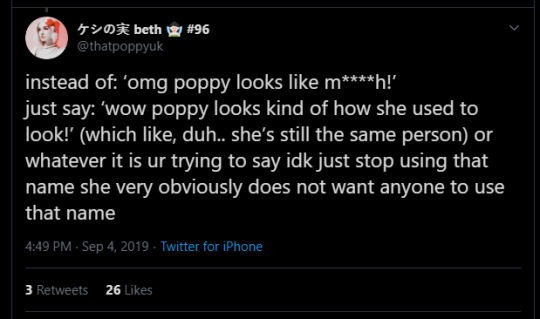
Not only is it potentially insensitive to call Poppy ‘Moriah,’ it’s simply inaccurate. For better or worse, people don’t regress, they progress. Poppy is not doing something so #basic as ‘returning to her roots,’ she is becoming who she’s always wanted to be.
VI.
Now that we have completed the necessary groundwork, we are able finish off the rest of the song. Lyrically, “Scary Mask” is rather focused; we’ve actually covered all of Poppy’s lines, so I’d like to examine the role Jason Butler from Fever 333 plays in the song.
I’ve actually refrained from gushing about how good “Scary Mask” is until now, but I don’t think I can contain myself any longer. Fever 333 was an excellent feature that perfectly meshes with Poppy’s harmonics and the chomping guitar riffs. Not only that, but lyrically, Jason Butler brings an insane performance. He brings scary mask to life.
Fever 333’s role in the song is complicated and will take multiple approaches to flesh out. First, consider the scary mask (Jason Butler’s lines) as an entity speaking for Poppy, as though it were some demonic hype-man:
This would then explain the line, “well you heard the woman, so fucking look away.” It appears that Poppy needs someone telling others to “fucking look away,” betraying a sense of dependency. After all, if Poppy could handle such onlookers on her own, she wouldn’t need someone else telling them to ‘beat it.’ We may interpret this as a sign that Poppy has come to rely on the shielding-nature of the mask. She relies on her persona for protection, but reliance gives way to over-reliance. Naturally, substitution and dependency follow.
However, this isn’t wholly satisfying, nor is it very charitable. Let’s consider another, more empowering, approach, this time as Poppy speaking through the mask. In this case, a synthesis is underway between Poppy and her new persona (read: scary mask). During the violent transformation, she screams and struggles as the darkness of the mask washes through her, until the process is complete and both are one. Or, rather, Poppy is transcending her persona through her persona, a process of metamorphic self-realization.
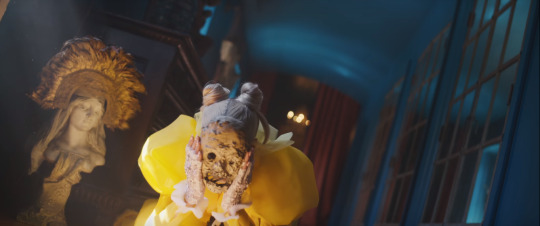
Approaching the relationship between Poppy and the mask as a symbiotic one will perhaps explain one of the most bizarre lines in all of Poppy’s discography (minus every line in “Voicemail,” of course): “You ain’t gonna see me tonight!” I mean, what the hell. It’s difficult to explain how much this line confuses me, words simply elude me. This is one of those lines that normal people would shrug and come up with a half-hearted explanation such as: “well, Poppy is wearing a mask, and because she is wearing a mask, you aren’t going to see her. You know, because she’s wearing a mask.” Poorly-conceived explanations such as these negate the whole point of studying art. You can’t just jerk responsibility when ‘the going gets tough.’ The reward isn’t merely the end result, and people who believe this are the exact same people who Genius exploits. It is the work, the method, the climb, the struggle that is important because it is while grappling with the piece that one learns the most about oneself. With that being said, this line has haunted me for three weeks now, but I think I can do it some justice.
First, we examine the context in which the line appears in the song. The line first appears near the beginning of the song, wedged between a crushing guitar interlude and the Poppy’s staccato-ed “M-A-S-K, am I okay?” build-up. Then the line comes again at the end of Jason Butler’s insane post-chorus breakdown which is interlaced with Poppy’s disembodied screams. This second appearance follows a punchy chorus from Poppy and directly precedes a charged guitar solo and Poppy’s explosive final meltdown. From all this, we notice that “You ain’t gonna see me tonight!” is always delivered amidst a great deal of turmoil, always sprinkled into the middle of a violent episode.
Next, we look at the line itself. “Ain’t” and “gonna” are very colloquial, like the speaker hasn’t been taught to speak ‘properly’ or has lapsed into a state where they are unable to or simply do not care. I’m also picking up a touch of mentally-disturbed giddiness, as if some deranged killer is frothily barking this at you outside your window while his head jerks around. “Well, I’m definitely glad not to live on the ground-floor.” Likewise.
I must comment, however, that “Tonight” is an odd word choice. “Well, maybe they just needed a word that rhymed with ‘alright’?” Remember what I said about giving up when things get difficult? No, “tonight” relates a sense of shadowy immediacy, like a doom drawing near. Perhaps Poppy is about to descend upon the world, shrouding it in darkness with her black angel wings.
Hence, “You ain’t gonna see me tonight” relates the sense of foreboding violence that comes with Poppy’s new persona. This makes a lot of sense in the context of Poppy’s work because I Disagree is likely going to be her most aggressive album yet. See, for instance, “I Disagree.”
Basically: full dark, no stars; Poppy’s out for blood, time to take cover.
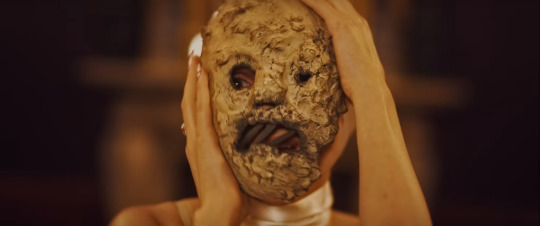
VII.
In summary: the ‘scary mask’ is a protective garment for Poppy as well as an empowering one. The adoption of an artistic persona allows her to cope with criticisms and continue her work. Recently, she has adjusted her work, and thus, her persona, to something truer to herself, and “Scary Mask” was an integral part of her transition.
Well, wasn’t that fun? I know I enjoyed myself.
Wait, what? You have a question? Ah, wait—I know what you’re thinking:
“If Poppy only wears her ‘scary mask’ when she’s ‘afraid she won’t belong,’ then why is she ‘never going to take it off’?”
Well, maybe she feels like she will never belong.
5 notes
·
View notes
Text
Me Laughing
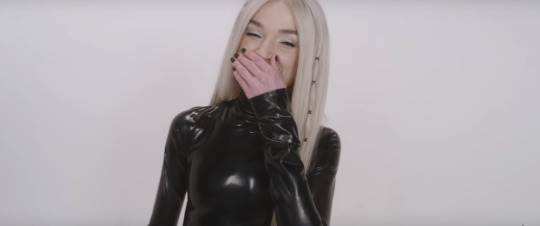
must’ve been one hell of a joke
Preamble
So, I was in the middle of writing a piece on [redacted] when Poppy released a 27-minute video of herself laughing. Naturally, that took priority. Sorry for my absence, this post took some time. And by “some time,” I mean “45 hours.”
This may be the best thing I’ve written, but it’s also the most insane thing I’ve written. In fact, I would label this post as ‘maddening.’ It’s possible you won’t be able to look at Poppy the same way again. I know I don’t. You can’t unread this, readers beware, [other dramatic warnings], etc., etc.
Descend when ready.
…
…
…
I thought “Concrete” was pretty #wild, but “Me Laughing” takes the cake. This video is pure lunacy, and I mean that somewhat literally since Poppy does laugh at what appears to be nothing for almost half an hour.
Due to the sheer insanity of “Me Laughing,” I’ve put together a handy little collage to help readers follow along. Behold: my barely passable Paint skills!

the pic for Section 4 basically explains everything
Before we begin, I need to address a few things. There’s at least, like, nine people who read this stuff, and while I can’t say that I envy you, I can say that I appreciate you. Thanks for sticking around.
However, there’s a funny thing that happens when you know you’re writing for an audience. You feel pressured to adapt your style. I feel the need to be a little more careful about some of the things I say, but that’s probably for the best. Hopefully this extra care will result in more coherent posts, but I doubt it.
This post will be long. Partially because “Me Laughing” is long, partially because I’ve padded this out with shaky theory about how the world works. Guess that’s no different than my other posts, but still, feel free to tune that out if you’re just here for the Poppy stuff, though maybe you’ll find some of it interesting.
I tend to write authoritatively, which may be misleading because I’m not always confident about what I’m saying. I simply enjoy taking things to their natural conclusions. Typically, there’s something interesting at the end. Or, at least, a premise insane enough to make writing about it enjoyable. See, for example, my post on “Concrete.” This post won’t be much different, maybe just a little crazier.
Now, I’ve got a funny feeling that some people may think I am “reading too much into this” or that Poppy’s work “isn’t that deep.” Hey, I get it. Those objections are completely understandable. I was once there myself, but now I’ve moved away from thinking that way. I’ll do my best to explain why.
From what I’ve seen, aesthetics (roughly: the study of art) is a total battlefield. Nobody agrees on anything, everybody thinks that only they can ‘properly’ understand art and that everyone else is wrong. There’s people who think beauty is objective, there’s people who think “no, that’s stupid, beauty is obviously subjective,” and there’s even the people who outright deny that aesthetics exists. Recently, we also had the pleasure of witnessing the aesthetics debate become another facet of the everlasting culture war. Think a line from “Play Destroy” sums my thoughts about that up: “oh boy!”
Needless to say, it’s a massive shitshow.
Despite my rather war-torn depiction of modern aesthetics, it might be a good thing that we can never ‘understand’ art. I hear that’s, like, part of the point. If art was ever ‘solved,’ well, we’d be faced with the idea that there is nothing ‘special’ about being human, that we’re just sacks of meat bumbling around with no purpose. Then everybody would, like, die or something. Truth hurts, art heals, let’s stay alive.
Anywho, I mention all this because there’s no rigorous way to determine how ‘deep’ a song (or any piece of art) is. You can’t just take a stick, poke it into some art, and say: “yep, this Poppy song is 75 [metres/fathoms/hands/whatever nonsense unit] deep!” Besides, nobody even agrees what ‘artistic depth’ means, and most attempts to define it flounder. If you listen closely, you can just faintly hear Goodhart laughing.
This is also why people who think they can ‘objectively’ analyze art are dogmatic blowhards. Any amount of rigorous thinking reveals that our standards for what make art ‘good’ or ‘bad’ are entirely baseless. No, seriously, it’s a case of channeling your inner Socrates and repeatedly asking ‘why’ until the other person throws their up their arms, leaves, and stops answering your texts.
We don’t even know what art is, so thinking you can ‘understand’ art and judge its ‘depth’ is pure arrogance. At least, until someone finds a way to math that shit. “Sounds solipsism.” Well, ya gotta start somewhere.
Now, does this mean we should also throw up our arms, say: “screw it” and return to binging Netflix and eating foods that you know aren’t good for you but you eat them anyways because they make you feel good and that’s what you need right now? Well, no, actually.
Even if we aren’t 100% sure what art is, or what we should do with it, there are some theories on art that I would call: “pretty not-terrible.” Some people have spent their entire lives thinking about these things and their insights are fascinating. However, I’m not here to talk theory. If you want to learn more, go pick up a book or something, nerd.
Anyway, one time this German guy said: “without music, life would be a mistake.” He also said that looking at things from multiple perspectives is pretty neat, so that’s what we’re here to do. Turns out art is kinda fun and spending a bit more time thinking about it pays dividends.
See, art just wants to be understood and so does Poppy. I want to give her and Titanic the benefit of the doubt and take them seriously as artists. While I don’t think everything they produce is God’s gift to earth (see: [redacted]), I do enjoy the majority of their work. Plus, the abstract and absurd nature of their content means writing about it is a blast.
Whether I truly believe any of the interpretations I come up with is irrelevant. Hell, I’m not even sure half of what I say even remotely resembles what Poppy and Titanic envisioned. But, that’s not the point. Shallow readings are a dime-a-dozen, see: Genius; I’m here to provide something better. To show that Poppy’s work, or any art, really, can be a whole lot more fun if you spend even just a teensy bit of time analyzing it. Hopefully I can also provide some of the tools to do so.
Enough rambling, let’s get into it.
Intro
At first glance, “Me Laughing” seems like Poppy doing cute ASMR for 27(!!) minutes while simultaneously trolling anyone who expected a video titled “Me Laughing” to be about anything different. Sure, but that reading gets a ‘B’ for ‘Basic.’
Yes, Poppy and Titanic often troll their audience. See: “A live Interview with Poppy.” But the trolling is both part of the delivery of their message and part of the message itself. So while “Me Laughing” looks like a simple ASMR troll video, I’m going to argue that it’s not.
Previously, Poppy released videos like “Delete Your Facebook” and “I’m Poppy.” Fun vids, but they’re made of looped clips. Thirty seconds in and you’ve watched the whole thing. Consider: “Me Laughing” is 27 minutes, but no parts are looped, it’s all original. As always, I’m just here to ask: why?
Since “Me Laughing” is not made up of looped clips, but is instead all original content, there is an inherent progression to the events. Each segment is unique, and when considered sequentially, pieces from each section build on each other to produce an artistic whole.
Yes, that’s a fancy way of saying it has a ‘story.’
Also, if you’ve watched the video, you’ll know that something just feels ‘off.’ If “Me Laughing” was ‘just’ Poppy ASMR, why does she constantly focus on a single point in the distance? What’s with Poppy’s frequent stares into the camera? And why the fuck is she wearing latex?
Clearly, something else is going on.
Detailed Summary
Let’s recall what actually happens in “Me Laughing.” Hopefully this recap will convey a sense of what ‘else’ exactly is going on and make the insane claims later on in the analysis a tad easier to swallow.
“Me Laughing” starts off pretty normally. Sections 1 and 2 are mostly Poppy laughing, as promised. Even in these early sections, however, we can still pick out some peculiar things.
In Section 1, and throughout the video, we see Poppy looking upwards as she laughs, as if she was remembering something funny that happened. Or as if she was thinking about something for a while and suddenly found it hilarious. “Maybe Poppy just looks upward when she laughs.” Doubtful. Try doing it right now. Feels weird, right? Whatever, moving on…
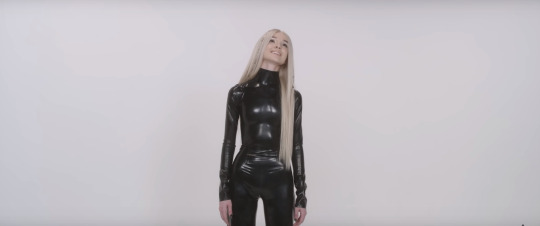
Next oddity: there’s a strange transitioning shot at the start of the video and between Sections 1 and 2 where the camera sweeps over Poppy’s latex-ed body. “Well, maybe Titanic just thought it would be cool to do it like that.” Yes, but why did he think it would be cool? Why that transitioning shot, out of all the possible ones? What purpose does it serve?
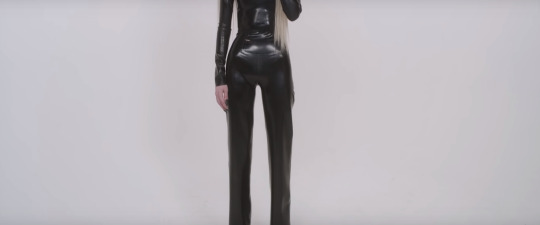
Also: Section 1 was a very steady shot, probably filmed using a tripod, or whatever fancy word camera-people use. However, the shot for Section 2 is shaky. Like, weirdly shaky. Maybe even too shaky. And this isn’t the only section filmed this way, half of “Me Laughing” is too. “Well, maybe Titanic can’t hold a camera steady.” No, that doesn’t seem right. We know Titanic can, in fact, hold a camera steady, or, at the very least, he possesses the means to take a steady shot. See: literally all Poppy videos. No, the shaky-cam is intentional. Again, I’m just here to ask: why?
Now, I don’t mean to tip my hand too much here, but to me, the camera’s sway resembles the unsteady gaze of a curious observer. Perhaps one who is timidly stepping around the beheld, drinking in all the angles. Recall my post on “Touch Poppy.” With steady camera shots, it’s easy to forget someone is on the other side, but with unsteady shots, it’s downright impossible to ignore, e.g., “wow, that shaky-cam is really noticeable. What is this, a shitty sequel to the Blair Witch Project?” Perhaps these sections were filmed this way to emphasize the presence of an observer. As for why such a thing would be emphasized—well, we’ll get to that.
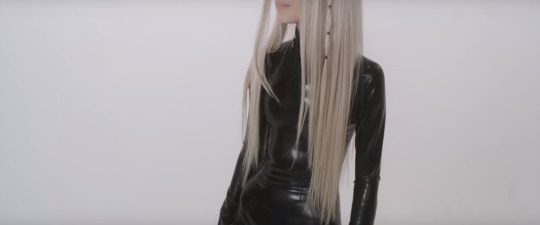
Around the 3:30 mark, Poppy shakes her head and clearly utters a, “m-mm,” as in, “nuh-uh, no way.” This gesture is repeated throughout the video. I’ll let you think about that one.

The video continues, and at 3:52 the camera lazily pans down, focusing on Poppy’s body and cutting her head out of the shot for several seconds, similar to the transition shot from Section 1 to 2. Thirty seconds later, the same thing happens. Guess this isn’t just Titanic diversifying the shot composition. It’s also about this point where attempts to pass “Me Laughing” off as anything resembling a ‘normal’ video start to fall apart.
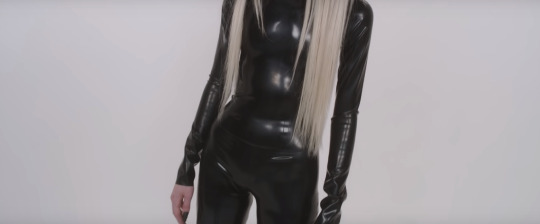
Poppy’s sitting position in Section 3 is both clever and hilarious. It shows her whole get-up, highlighting how absurdly tall her platform shoes are. She also flip-flops her feet back and forth several times as if to further emphasize her mega-shoes. Why would she wear such crazy shoes for a simple video of herself laughing?
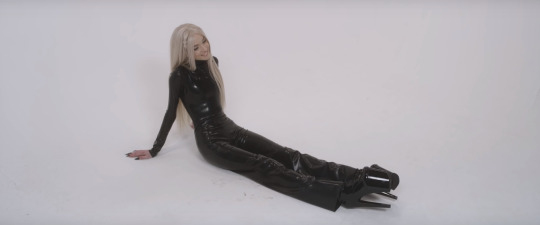
That’s not all that’s ‘off’ about Section 3—this is also the first section where Poppy stares at a spot in the distance for a prolonged period of time. In several instances, she quizzically tilts her head to the side, not unlike a faithful dog trying to decipher commands from her master. At 6:23 we also get a clear “huh,” a noise of acknowledgement, of understanding. Further, Section 3 has several stretches of silence where Poppy is no longer laughing. She just sits there while you watch. It’s… unsettling.
Section 4 is shot in a similarly shaky-style to Section 2, but this time with Poppy sitting down. Also, we see instances of Poppy focusing on something off in the distance both when she is laughing and when she is not, as was the case in the previous sections. However, there are some weird things about Section 4 that set it apart from the others and further develop the video.
Around the 8:38 mark, Poppy utters a “mm-mm-mm” sound while shaking her head and staring off into the distance. It’s fairly clear that she is communicating with something off-screen. Perhaps entities that are invisible to us. It wouldn’t be a stretch to say these off-screen entities are the things making her laugh.
We will see more evidence of Poppy supposedly communicating with invisible beings later, however, this is bordering on fetishizing Poppy’s lore as opposed to analyzing her artistic message. If you’re half-learned on Poppy lore (which, you better be, considering the fact that you’re reading this), this would be like focusing on the identity of ‘They’ instead of the significance of ‘They.’ Another example would be focusing on the ‘origin’ of Poppy, e.g., is she an android? Who is her creator? Etc., instead of asking why someone would create the artistic work of Poppy in the first place and/or considering the implications of said work.
If you’ve read anything else I’ve written, perhaps you’ve noticed that I try and stay away from acknowledging that Poppy even has lore. I want to take Poppy seriously, not literally. Or, in “pretentious asshole” terms, to consider her work artistically, not canonically. There are many reasons for this and I didn’t just get here randomly overnight, but that’s for another post.
Edgy ranting aside, there’s another part of Section 4 that I’d like to point out. Before this section, there was only a single instance of Poppy looking into the camera (happened in Section 2), but in Section 4, she frequently looks into the lens, acknowledging that an observer is present. She shoots this observer a flurry of dark and mischievous glances. Then she laughs.
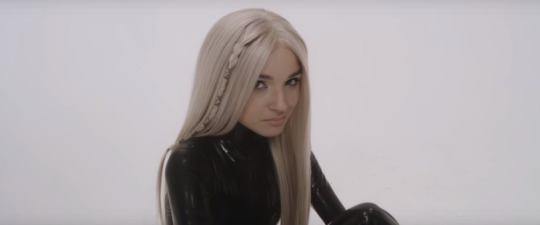
Section 5 features more head shaking, distant staring, etc., but it is also a relatively sad section. Poppy laughs very little, and frequently looks down. Yes, a pun. Poppy has been laughing for most of the video, so why, all of a sudden, does she seem so sad?
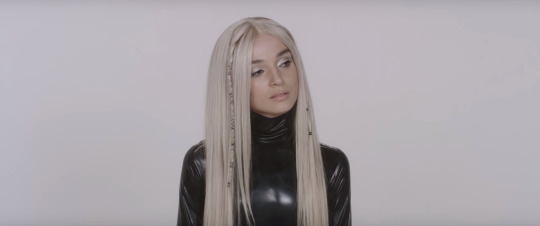
Section 6 is shot shakily and close-up. I mean, really close-up. Like, right-in-her-face close-up. To the point where the camera is often out of focus. We’re also given a blatantly voyeuristic sweep over Poppy’s chest as the camera shifts position around her. Further, there are several instances where Poppy looks deep into the camera, with what I refer to as a “model pout,” where she slightly parts her lips and opens her eyes wide. Recall my post on “Computer Boy” where I talked about the fan-idol relationship. That lustful look? It’s for you, except everybody knows it’s not.
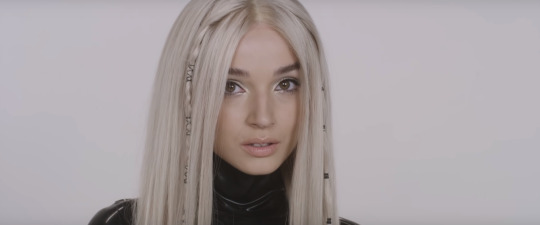
Quick note: I will elaborate on this when I talk about “You’re Too Close,” but it’s important to stay mindful and know that despite some uncomfortably voyeuristic shots in “Me Laughing,” it doesn’t necessarily mean that the video, or anyone who worked on it, is, y’know, perverted or something. Depicting the voyeuristic nature of idolism is how we talk about the voyeuristic nature of idolism, the same way that depicting racism is how we talk about racism.
The problem is that nowadays, we are trained to think quickly, not critically. Your initial response (also called your ‘knee-jerk’ response) to Poppy’s work shouldn’t be your final response to it. It’s important to consider context and think carefully. Ask yourself: why would Poppy choose to show you this? What does she want you to think about? What is she trying to tell you?
Section 7 is where things start to get really fucking weird.
Previously, I said that there was something darker lurking in “Me Laughing,” and Section 7 is where this darkness begins to manifest. The segment starts with Poppy having another one of her imaginary conversations with demons or whatever where she nods her head and gives some “mm-hmms” in agreement. Shortly after, she looks right at the camera and laughs in your face. Not only is her laugh absolutely maniacal, but it seems completely sincere too. This section really relates the feeling that you are not in on the ‘joke’—maybe the joke’s about you.
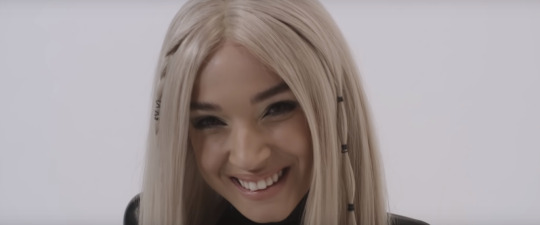
Section 7 also provides a sense of violent foreboding: a creeping feeling that something is going to happen to you, but you don’t know what that ‘something’ is, and you have absolutely no power to stop it. What really drives this sense of helplessness home is the way the scene is shot. At one point, the camera spends a few seconds just looking at Poppy’s hand. This emphasizes your lack of control. You are completely at the mercy of the camera’s whims. You only see what is shown to you. Then, as the scene closes, the camera is put down in front of Poppy, and, after a few tense seconds, she slowly reorients her body and starts crawling towards you. Luckily, the camera is picked up before she reaches it—you were saved, but what if you hadn’t been?
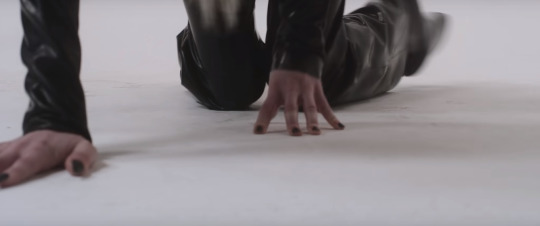
Oh, right, I forgot to mention: Poppy didn’t laugh much in this section.
Section 8 is a more amped-up version of Section 6. We get Poppy staring deep into the camera for almost the entire scene’s duration. Her lustful gaze relates a feeling of vulnerability, like you are spying on a defenseless little girl, but at the same time, it feels like she is giving you one last dose of what you want before she brutally murders you.
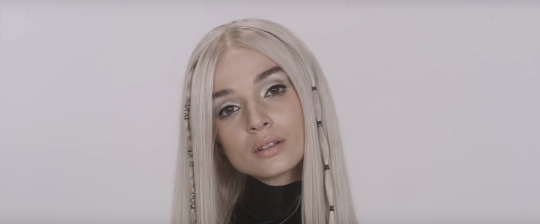
Section 9 is fairly straightforward. We have Poppy staring at a fixed point in the distance as if she is receiving orders from her alien overlord. We also get several rapid glances toward the camera, as if her orders somehow involve you, or as if she and someone else are sharing gossip about you right in front of your face.
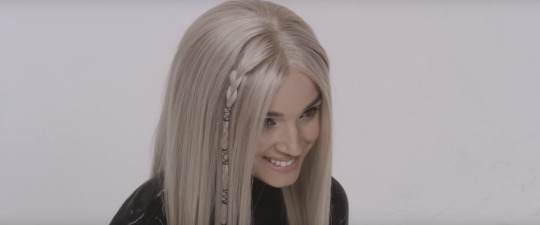
…
…
…And then Section 10 happens.
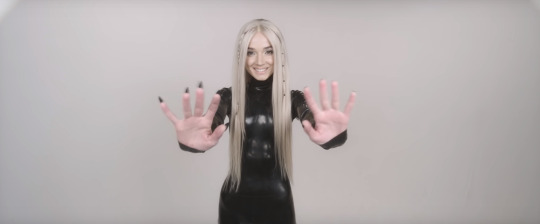
Poppy says: “goodbye.”
In Section 10 we have a bit of a climax. No, not that kind of climax. Well, unless this essay is really doing it for you.
The first interpretation of Section 10 is fairly basic, Poppy is waving goodbye because you’re about to die. Obviously, whatever scheme she and her invisible monster friends cooked up is going to be carried out, and it’s probably going to result in the destruction of everything, yourself included. This is sad, probably, but she seems to find it highly amusing. Again, I’m not a fan of obsessing over canon or lore, so I’ll tackle this one slightly differently in the analysis, but I do think this reading of “Me Laughing” is at least semi-faithful to Poppy and Titanic’s vision. This interpretation also serves as a very nice teaser for P3. I mean, if “Do you disagree?” has told us anything, P3 will have a lot of destroying.
The next reading of Section 10 involves the objectifying nature of idolism. Yes, the $5 words are starting to come out, brace yourself. Anyway, in this section, Poppy giggles as she waggles her hands around, back and forth then forth and back, as though she is using her hands for the first time. Almost like a shiny, new automaton discovering its motor functions. It’s cute, but silly. And by silly, I mean overly silly. You have to remember that Poppy is played by a woman in her mid-20s. Reminds me of some lines from “Hard Feelings”: “my arms and my legs are so stiff / Is that the way you wanted it?” Or, rather, is this how you want her to act?
At the end of the section, the camera moves right up to Poppy’s face and she looks at you and just… stares.
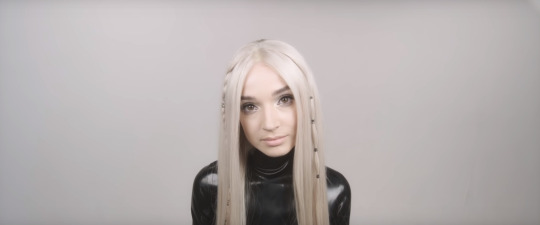
…
…
…
And stares…
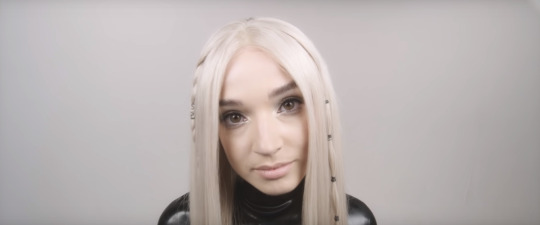
…
…
…
And stares…

…
…
…
She knows.
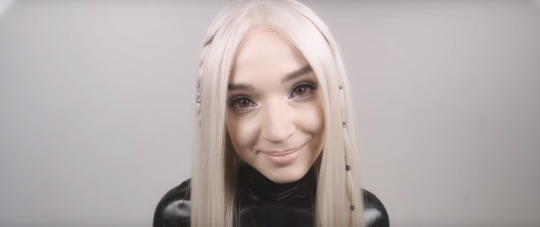
Finally, we get to Section 11, which would be my main argument against the totally boring ‘Poppy communicating with demons’ reading. Poppy is seated, again, with her arms wrapped around her thighs. Note again the sense of her smallness and vulnerability transmitted by her sitting position. Also note the way the shot is filmed, with the camera looking down on Poppy and frequently swooping in for close passes.
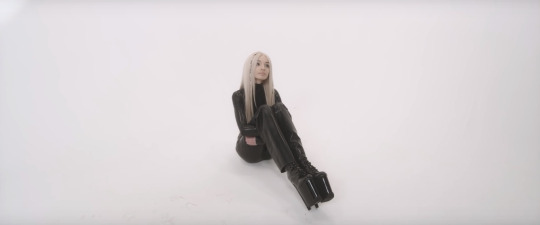
And then, in the last two seconds, something really bizarre happens. For a brief moment, some foreign object enters the shot, just in the very corner. Now, I’m about to make a weird argument, be wary of it. Other than the random piece of equipment entering the shot, “Me Laughing” does not end off on a noteworthy moment. Just Poppy sitting there, looking up at the camera. Plenty of instances of that. The video could have easily been trimmed by 2 seconds and nothing would have changed. We can also (probably) assume that somebody carefully reviewed this video before it was uploaded.
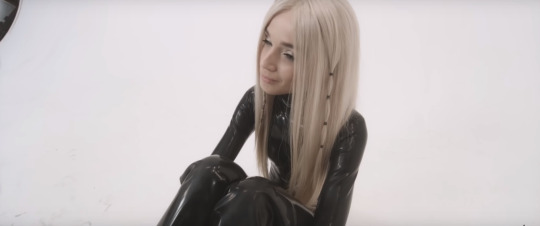
We’re left the possibility that those last two seconds were left in the video for a reason. And that reason is—
Hey, wait a minute, was that a mirror?
Analysis
“Me Laughing” is a really interesting video, and you can have a lot of fun if you spend some time looking into it, so that’s exactly what we’re going to do. We’ll tackle it from several different angles, watch for the switches.
Quick words of warning here: I’m about to use the words ‘parody,’ ‘satire,’ and ‘sarcasm’ interchangeably, a practice some would refer to as: “really fucking lazy.” Frankly, I don’t give a damn, I’m not a professional, I’m going to type my silly words anyway and you can’t stop me.
As content loses any sense of shame in attempting to draw your attention, nuance withers away and it becomes harder and harder to differentiate parody from parodied. For example, is “Old Town Road” criticizing the state of the music industry or embracing it? Now, I’m positive that Lil Nas X has the self-awareness of my pug when he’s lapping up his own boogers, yet I personally couldn’t write a song that so perfectly encapsulates everything wrong with modern music. So, is “Old Town Road” a parody or not?
This is where someone ripping off Westworld would say: “if you can’t tell, does it matter?” to which I would answer: “yes, yes it does.”
Context may be fleeting, unreliable, and arguably nonexistent, but I still believe it’s possible to differentiate parody from parodied, it just takes a little more effort. See, I think “Me Laughing” is satirical as hell, especially considering its context within Poppy’s body of work and how it compares to mainstream internet content.
First, consider that the frankly-titled video “Me Laughing” was hyped up for three days before it ‘premiered’ on YouTube. Hilarious, but also incisive. Who waits three days to see someone laugh? “Well, I did.” Ah.
The sarcastic nature of the video also shines through in the description, which reads: “A motion picture starring Poppy.” There’s a tired, yet necessary, statement here on the continuing degradation of internet content. What won’t people eat up?
We all know Poppy’s no stranger to sarcasm. See: “Bleach Blonde Baby” or “Poppy loves Politics.” She will often refer to her videos as “high quality internet content,” while uploading videos of herself eating cotton candy or ‘ooo-ing’ at things. With “Me Laughing,” a video where she laughs for 27 minutes, Poppy further questions where the line is regarding what content people will happily consume.
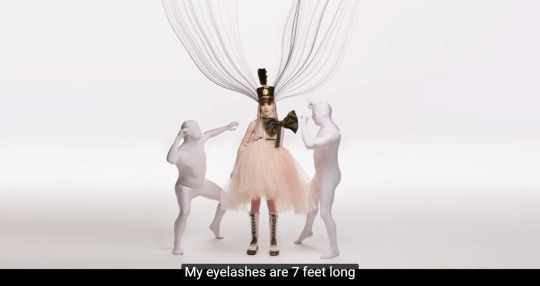
Fun story: I’ve seen people call “Me Laughing” ASMR. In fact, I think I did, at some point. Huh, I should probably change that. This isn’t totally wrong, but know that “Me Laughing” takes so many shots at ASMR you’d think the video shared a set with Sicario. And, if that’s the case, they could have saved some money and just filmed the video in my neighborhood haha… hah… ha… (seriously though I’m in danger)
Considering “Me Laughing” as a genuine ASMR video would obviously be antithetical to Poppy’s entire body of work. Recall lyrics like: “Poppy is an object.” No, “Me Laughing” is much more than simply Poppy recording cute ASMR.
Poppy has been questioning the nature of people’s ASMR obsession since her first YouTube video, “Poppy Eats Cotton Candy,” where she had the mic uncomfortably close to her throat so her little gulps and coos were clearly audible. What leads to people wanting to hear these things?
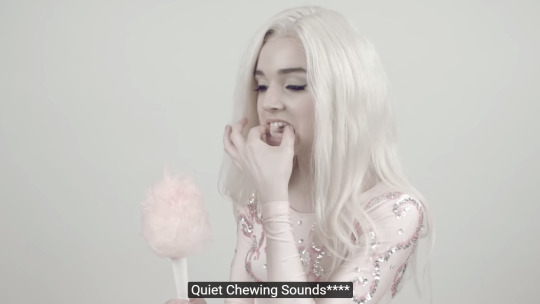
Zoom out: many of Poppy’s videos are about obsession. Forget that and the point will fly right over your head. Let’s now reframe the question: why would people want to hear such intimate sounds from Poppy? Answer that and “Me Laughing” will make a lot more sense.
What I’m about to say next will be very dense because it will outline the thesis of a large part of Poppy’s work. Sorry, hopefully it’s still readable. I’m still developing my interpretations of her work, and I promise to expand and explain them more in the future.
I’m also sure some fans will want to stab me in the neck with a rusty spoon for this post because it’ll appear like I am directly criticizing them. In reality, I am actually insinuating that Poppy is criticizing them, but nuance is dead, knee-jerk reactions reign supreme. Whatever. If you react that way, it means you’re so eyeballs deep in obsession that you fail to realize why Poppy courts your obsession in the first place. Poppy’s work entices fans to obsess over her, but it also berates those who do so.
Note that this is all as a means of criticizing the status-quo. And guess what: fans are part of the status-quo. It stings when you realize your idol’s criticisms are actually about you, but I’m not convinced Poppy is malicious. She wants you to be a better person.
This is my best estimate of her thesis: the nature of the objectification of celebrities is rooted in a sexual obsession—that is, a desire for their bodies. Pun intended. Objectification stems from fantasizing over what the celebrity shows you, which is almost always physical, or at least results in the fantasy manifesting itself as a physical representation.
In other words: “everybody wants to be Poppy.”
Poppy recognizes the inherently sexual obsession with figures in the ASMR community. She wears latex in “Me Laughing” to draw attention to this. It’s as if she was saying: “this is what you’re here for, right?”
Note that obsession is inherently progressive. It grows and grows, eventually leading to fans voyeuristically observing the objectified person’s intimate bodily functions. This culminates in “Me Laughing.” Poppy knows what you want, but as payment, she’s going to leave a nagging feeling in your brain that somehow you have done something wrong. That you shouldn’t really be watching this video, but she knows you are.
Recall Titanic’s comments about making people slightly uncomfortable. Consuming is harder with a lump in your throat. The key to understanding Poppy’s work is to ask why she wants you to feel uncomfortable. What about your behavior does she want you to realize?
Earlier in the post, I mentioned that I’m not a huge fan of the whole ‘Poppy talking to demons about destroying the world’ reading because it comes dangerously close to obsessing over her lore. Lore is like history without the usefulness, so I’m going to ignore it. Regardless, I said I would use that interpretation for something more interesting, so I’d like to ask:
What makes someone want to destroy the world?
Throughout “Me Laughing,” Poppy shoots dark glares at the camera. There’s something sinister in her eyes, something genuinely evil lurking in her gaze. We know she obviously has an immense disdain for the status-quo. What else would lead to lyrics like: “down, let it all burn down / burn it to the ground”?

Preceding any cries of “viva la revolución!” or “apocalypse, now!” is an implicit judgement that what is left of the world is either not able to be saved, or not worth saving. That tearing everything down and beginning anew is preferable to salvaging what remains. To reach such a mindset, one would need to see modern society with such disgust and be so disenchanted with our current world that it no longer appears worth preserving. One would also need to have given up hope on the ability for people to come together and solve their problems. To have lost hope in humanity’s ability to adapt and overcome. To think that perhaps our problems have become too big for us to solve, that perhaps we have finally dug too deep a hole to climb out of.
Again, people don’t reach a hopeless mindset overnight; it takes many steps to descend into the darkness. But, the numpties on r/GetMotivated tell me, “every journey begins with a single step,” so let’s take one together.
In a tweet, I mentioned that “Me Laughing” was also about absurdism. No, that wasn’t a typo for ‘absurdity.’ I may write ridiculously deep-dives into Poppy lyrics and lore, but I try not to waste words.
Anyway, let’s play a game. I call it the “imagine something real quick because I need to prove a point” game.
Imagine being stuck in a system. Yes, it’s cliché to use the word ‘system,’ and any time you do, it carries the connotation that you are some conspiracy nut, e.g., “you can’t trust the system man!” I understand all this, please just bear with me and let me use the word, it’s useful. Anyway, you don’t like the system because a lot of the system is bad and it’s slowly, but surely, getting worse. The cracks are starting to show and the whole thing is poised to come crumbling down. Okay, that’s not good, you want to tell people about this. To warn them. However, in order to obtain a sizable audience for your message, you need to first succeed within the system, and to do that, you need to play by the system’s rules.
Okay, no sweat, you release some pop songs. There’s a couple of them that people really dig. Unfortunately, the songs people like don’t contain much of your message. They have a watered-down version of it at best. That’s a little sad, but oh well, at least you’re getting some sort of message out there. Hey, maybe if you make the music video really weird, people will realize there’s something more going on! Hm, that didn’t seem to work either.
So you release some YouTube videos too. Some of them are pretty biting, especially that one on politics. Should get people thinking, right? Hah, no, wrong. People like them, yes, but not for the reasons you want. They like them because they’re “weird” and “addictive” e.g., “its 3 AM on a school night and I’m still watching Poppy videos why can’t I stop lolol.” Imagining that the videos contain some sort of Illuminati-esque hidden message to decode is preferable to examining the real-world implications of the work. Plus, like, there’s experts for that, right?
Anyway, a couple albums and hundreds of videos later, you have a sizable following, sweet, now you can transition to doing what you’ve always wanted to. Change the persona to something a little truer to yourself. Make your message a little clearer. Finally, you have the power to change the world like you always promised you would.
Uh-oh, Houston, we’ve got a problem. Your audience listened to you for X, but now you’re giving them Y. It’s not a total loss, though. You have a lot of loyal members in your audience, and they like your new stuff too. Doesn’t matter what you make, they’re loyal, they’ll watch/listen/whatever to it. Their dedication has become investment which has become even more dedication. In fact, they’ve been following you since the start, when you were first trying to get big. “Yes, but I was trying to get big because I wanted to spread a message and to do that I had to make compromises to grow an audience so people would liste—“
They also have their own ideas of what you’re saying, plus, like, they make neat art, here, check this out, please give this a listen, look at this, read this, please, please? “Hey, nice article. Wait, the next one is how many words?!” And you keep every piece of fan art because it really does mean a lot to you. “Wow, I appreciate it, that’s beautiful, thank you. Oh, what? There’s even more?” Hey, if you have spare minute, could you give a shout-out to my friend? It’s her birthday. “Sure, hold on…” It’s also my birthday tomorrow, could you give this post a like? “Um, okay, just give me a minut—“ Also, could you answer my DM on Instagram? It’s important. And after that there’s only 100 more to answer! kk thanks! “Wait… one second… whoa!”
Now you’re releasing Z, hopefully that will get your message across…
…
…
…
Wait—what was your message again?
…
…
…
Oh no.
…
…
…
Somewhere along the way, probably between performing [this] and signing [that], the essence of your message was lost. Whatever remains has been drowned out by the noise of the system. If we’re talking decibels, notifications are loud, problems are whispers, and these days everyone’s got ear plugs.
Thinking about problems is hard, thinking about them for too long is sad, being sad is uncomfortable, hey, look, Taylor Swift just dropped a new album, that “Lover” song is dope, let’s look at memes.
So, you want to change the system. But to change the system you need power. To get power, you need an audience. But the only way to get an audience is to make content that gets rewarded by the system. And the content that gets rewarded by the system is that which is easily digestible for a large audience, i.e., devoid of substance. I mean, I don’t know about you, but I don’t think “Turn Down for What” resulted in much positive social change. “Well, maybe the system should reward content that is creative, challenging, and conscientious instead!” Ah, yes, I see what you mean. So, you want to change the system…
Pass the mic, Camus, I’ve got a real knee-slapper for ya. Oh, right, guess I’ll just grab it myself.
These days, we’re faced with a new kind of absurdism, one which involves recognizing that societal systems are getting worse and need changing, while simultaneously recognizing that you are chained by said systems, and thus, powerless to change them.
This new absurdism describes the maddening exercise in doublethink where people wrestle with the knowledge that they should be Making The World A Better Place but also the knowledge that they cannot possibly live in a way that satisfies such capitalized phrases. The end result is a mental tearing fueled by impossible societal expectations and the inevitable guilt of failing to live up to them.
After a while, people stop fighting. They give up. They give in. When enough people throw in the towel, all that’s left is to hold on tight and enjoy the ride, e.g., the trajectory is set, all aboard, no, there aren’t enough seat belts for everyone, must have been one of those damn cost-saving initiatives.
“Yeah, that definitely sounds absurd. So… what do we do about it?”
Well, sometimes all you can do is laugh.
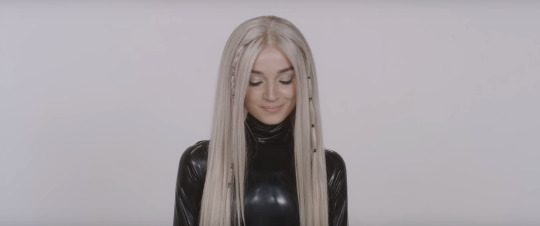
8 notes
·
View notes
Text
American Kids

1. I had “American Kids” on the August list. Sorry for the delay, “I was busy,” “better late than never,” etc. Already straying from my schedule, looks like September is off to a great start! Also, this one’s both dense and obtuse, my bad. Anywho, here are some words:
2. As is typical, let’s gush first: “American Kids” is easily the most thematically interesting song on Bubblebath. The production is also the tightest. I mean, do you hear this instrumental? You know what? I’m just gonna say it: “American Kids” is the best song on Bubblebath.
3. If you take some time to look at the lyrics, you’ll see that “American Kids” is actually a super weird song. Half the lines seem like their own random tangents, so it’s left up to listeners to piece everything together themselves.
4. When listeners are challenged to consider the connections between seemingly unconnected ideas, they are forced out of worn ruts and must instead open themselves up to possible associations they had never considered. Poppy challenges listeners this way all the time.
5. Genius tells me that “American Kids” is Poppy’s take on the ‘blame the millennial’ movement. Partially true, but that omits elements of Poppy’s disenchantment with the world and her struggle to break free of the music industry’s commercializing squeeze.
6. You’re best off analyzing lyrics yourself rather than using Genius. Genius readings are watered-down so they can be easily digested by anybody and everybody. So, they’re usually devoid of anything interesting. See also: fast food, Marvel movies.
7. Perhaps it’s best to think of “American Kids” as Poppy’s worldview presented as a mosaic, with each piece being one of Poppy’s thoughts crystallized in time. Or think of the song as Poppy Splatoon-style painting a picture of her worldview. Whichever analogy works best for you.
8. In “American Kids,” Poppy lays down a foundation for her future work to build off of. By looking at the underlying foundation, we can see how Poppy’s views have changed as she’s matured. “American Kids” lays a lot of groundwork, so it’ll take a bit longer to get through.
9. Since “American Kids” is so random and bizarre, we will first start by picking out specific threads. These are chains of ideas that link together. At the end, we will weave all these threads into one fabric. If your reading is good, each piece should mesh together nicely. If not, then-
10. “American Kids” kicks off with Poppy acknowledging the limitations of her worldview. She knows she is only exposed to specific information (“I live under a rock”), and she only has certain tools to process said information (“with a blacklight”).
11. From these lines we get a sense of Poppy’s self-awareness. She recognizes there is much she doesn't understand. Honestly, this self-aware hedging is pretty refreshing, especially considering the abundance of people these days endlessly blaring opinions that aren’t even theirs to begin with.
12. Poppy’s introspection continues with the line: “I’m a dumb pop star in my own right.” Again, Poppy understands how she appears. This line also relates an element of disgust, almost as if she has been forced to become something she grew up hating.
13. Reinforcing this notion is: “Sold my soul to the man with a handshake.” However, Poppy expresses her determination to still #DoSomething with her platform, to use it for Good (“Lost control but I don’t think it’s too late”). This idea is explored further by “In A Minute.”
14. Poppy also gives us the fun line, “Forever 21 is cool if I make it,” where she expresses the necessary fluidity of a pop star’s values. In such a role, she has to make sacrifices to succeed, like promoting products she doesn’t really believe in. If she doesn’t, someone else will.
15. Later in the song, Poppy mentions: “It never happened like they say.” In what ways do expectations differ from reality? The lines, “Started life at age 15, got ahead with fake IDs,” and “We’re dying young on broadcast news,” provide insight.
16. To even have a chance as a singer, Poppy had to get a headstart on the competition by starting at “age 15” and by finding ways to ‘break the rules’ (“fake IDs”). This adds to the sacrifices necessary to succeed in the ferociously competitive rat-race that is the music industry.
17. Overall, the first verse tells of the compromises Poppy has made to ‘make it’ as a pop-idol, and of the self-dissatisfaction she feels after making said compromises. The second verse expands on these ideas, telling us how she has separated herself from her old life to make her new life possible.
18. Poppy tells of how she has put distance between herself and her parents (“Last time I told mom that “I love you””), how she has given up aspects of her past life (“last time I ate food from a drive-thru”), and how she has abandoned her old possessions (“burned all my shit”).
19. Poppy also explains how she has forsaken her “teen regrets,” referring to them as a “trip wire.” Basically, any old emotional attachments or ‘what-ifs’ would only distract her and slow her down, so out of mind they go.
20. “I think my father might be gay but I don’t know” is a weird line. It does add to the idea of separating from the past, but it may seem odd that Poppy would even be concerned with her father’s sexual orientation, especially if you’re coming from AIAG.
21. This isn’t the first time Poppy touches on this topic. In “Software Upgrade,” there’s the line: “So come on, baby, tell me, are you gay?” If you compare Poppy’s old use of language to her more recent work like AIAG, you can see a clear progression of her views on identity and gender.
22. With the line, “Boys aren’t even boys anymore,” we see a concern with the absence of structure from the dissolution of traditional gender roles, but Poppy’s newer work (notably “Am I A Girl?”) embraces the freedom of increased individuality instead of decrying it.
23. Poppy ties the second verse to the first with lines like: “I should be everything you hate” and “I should be higher now than space but I’m static.” Again, Poppy emphasizes the self-loathing she feels after abandoning her values to succeed as a pop-star.
24. Before the first chorus comes, “Girls, let’s put on all of our clothes,” where Poppy plants the seeds for her later work on the objectification of celebrities. This became Poppy’s most prevalent theme. See: her videos, her fashion appearances, and “Girls In Bikinis.”
25. On the chorus, Poppy reiterates her desire to remain ‘apart’ from American kids these days. She emphasizes her abstinence from using drugs, and says (hilariously) that she doesn’t “care about your party.”
26. Not only does Poppy reject young peoples’ lifestyles, she is baffled by how and why people adopt such vapid and empty lifestyles to begin with (“I just don’t get American kids”).
27. Credit where credit’s due: there’s one interpretation I actually liked from Genius. It’s a reading of the line, “Drugs don’t work like they did for my parents,” where Poppy points out how the use of drugs has changed over time.
28. In the past, drugs used to be used as a mind-expanding substance. Substances that freed the individual. Nowadays, drugs are almost a necessity, a toll for living in modern times. Drugs are now a crutch, a fix to get people through another day of crushing monotony.
29. Sewing time. Picking out associations elicited from the song is important, but anyone can do that. The hard part is tying these associations together into a cohesive whole. We ask ourselves: what is the overarching narrative? What does the bigger picture look like?
30. Consider the meta-narrative of “American Kids.” A self-aware pop star reflects, with a pinch of disgust, on the compromises she’s made to succeed. That she has distanced herself from her peers, her parents, and her past self to ‘make it.’ How would this someone feel?
31. “American Kids” leaves us with a feeling of alienation, of exasperation, of someone who is disenchanted with modern society, yet has been forced to exist within its boundaries to succeed. “Liberty isn’t cheap and it ain’t free.” Huh, guess Poppy’s right.
32. Poppy’s final slash is delivered with: “I’m a millennial, blame it all on me.” It’s easier to point fingers than find solutions. But, in the words of Sum 41: “When we all fall down, who will take the blame?”
33. There’s one last part of “American Kids” I mentioned, but didn’t explain. Remember the instruments? Yeah, turns out those are kinda important. They’re harder to ‘read’ than lyrics, but if you’re analyzing music, it’s folly to ignore them.
34. Throughout “American Kids” are snippets of sound, flurries of voices that seep into the track. As Poppy closes the track, repeating “American kids,” her voice becomes increasingly distorted and muddied by other chatter until her signal is swallowed by a sea of noise.
35. At the end of “American Kids,” the gale of noise abruptly ends and we’re left with a final, echoing cry from Poppy, one that slowly fades into the background. “Is that symbolism?” Yeah, something like that.
7 notes
·
View notes
Text
The Holy Mountain

“It’s not about burial. It’s about ascension.”
1. “The Holy Mountain” is the most underrated song on Choke. It's Poppy's clearest mission statement, and it teaches more about the modern condition than your overpriced college course ever could. There, I said it.
2. We're going to ignore the choruses for now. They recontextualize as the song progresses, so we'll come back to them after unpacking the two verses. And there's a lot to unpack.
3. People don't realize this, but in most of her songs, Poppy is playing a character. This is fun because it makes it hard to tell what she actually thinks. Think: Plato but bleach-blonde and scary.
4. Take what Poppy says seriously, not literally. If you take her lyrics literally, you'll end up saying silly things like: "Poppy, don't yell at God!" or "Poppy, don't blow up people's pools!" Don't do this, it just makes everyone look bad.
5. Anywho, in “The Holy Mountain,” Poppy is representing the human race as both an ambassador and a symbol. See: the use of "we" and her insolent behavior in the second verse.
6. The song kicks off with Poppy recounting her meeting with God in a hilariously casual way, e.g., "so, I was talking to God the other day…" Unfortunately, nothing else about this song is funny, the rest is just kinda depressing.
7. Upon meeting God, he tells her to “wait,” which doesn't mean much at first. That is, until we learn that God also told Poppy the human race is "wasting away again."
8. "Again" is key here. It implies a cyclical nature to humanity's rise and fall. A wax-wane pattern. Poppy isn't told to “wait” because God has Jesus's PT interview at 5, she's told to wait because we're not at the right point in the cycle. At least, not yet.
9. Now, this isn't the first time Poppy has gone 2012 on us. In fact, her music has been getting increasingly centered around apocalyptic themes as time goes on.
10. Poppy first hinted at her lack of faith in humanity with “American Kids,” but her desire to #burnittotheground and start over has become more and more pronounced in songs like "Time is Up," "Play Destroy," and the upcoming "I Disagree."
11. The second verse opens with Poppy responding to God, asking: “how do I change my ways?” To which, God “laughed in [her] face.” Note that it’s not exactly clear what about Poppy’s question God finds so funny. I see two possibilities:
12. The first possibility is that God laughed at her because humanity cannot change its ways, that we are unable to break free of the wax-wane cycle of civilization, and that we are eternally doomed to repeat the process.
13. Now, this possibility appears to align neatly with the worldview Poppy has thus far presented in her work, and could very well be the way she would want us to interpret it. However, I find the second possibility perhaps even more interesting:
14. Suppose God laughed not because of the inevitability of our path, but because of the framing of the question itself. Asking an ethereal being for essentially the solution to all our problems means bucking the responsibility of cleaning up our own mess.
15. Besides, if we were just handed a simple answer to the world’s problems, would we even make use of the solution? And what would stop us from getting into a similar or even worse dilemma in the future?
16. The next lines add some color to the nature of the problem. Poppy rebukes God with: “how dare you put me in my place,” which appears to offer a misplaced sense of pride as a root cause of our modern debacle.
17. We will never revert to being hunter-gatherers—our wants have changed. Our lives are so intertwined with technology that we are shackled. Besides, who would give up their phone first? The only way through is forward, but forward isn’t so pretty either.
18. So perhaps we can change, but we won’t.
19. Reminds me of a Nietzsche quote: “Once upon a time, in some out of the way corner of that universe … , there was a star upon which clever beasts invented knowing. That was the most arrogant and mendacious minute of "world history," but nevertheless, it was only a minute.”
20. After Poppy’s outburst, God “started to pray for [her/us].” This conveys a sense of hopelessness about the situation, regardless of what exactly God was laughing at. If hope has forsaken us, what does Poppy offer instead? We now turn to the chorus:

21. Poppy tells us that the “only time we got to climb the holy mountain,” or, the only time we could a/tran/scend, was with the guidance of some omniscient power. However, the verses tell us that the chances of that happening are slim to none.
22. So instead, Poppy narrows the focus to the individual (the use of “you” in the line “if you know the way that takes you to the mountain”). If humanity in its entirety cannot be saved, maybe the lives of individuals can.
23. Perhaps Poppy means to say that while we “wait” for what she sees as an inevitable ‘collapse,’ there are still moments of happiness amidst the misery, moments of clarity amidst the darkness, and moments of enlightenment amidst the ignorance.
24. With the line, “let yourself be blown away,” Poppy tells us to cherish such moments, and to let them guide us toward a higher state of being, a transcendence of sorts. After all, what else can we do?
5 notes
·
View notes
Text
Touch Poppy (VR 180 Experience)
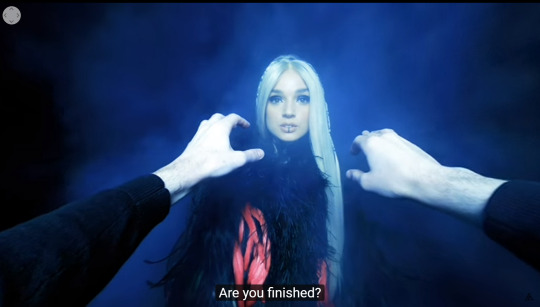
Touch Poppy (VR 180 Experience)
1. Some people think Poppy’s old videos are better than her new ones. Yes and no. Some of her older videos are pretty biting, but some of her newer ones are more mature and nuanced.
2. Quick warning: this video is possibly Poppy and Titanic’s darkest and most twisted piece. It made me very uncomfortable. That’s good—art should be able to do that. But if you’re not ready for that, maybe come back to this later.
3. Also, I think some Poppy fans might want to crucify me for this one. I don’t care. Let’s go.
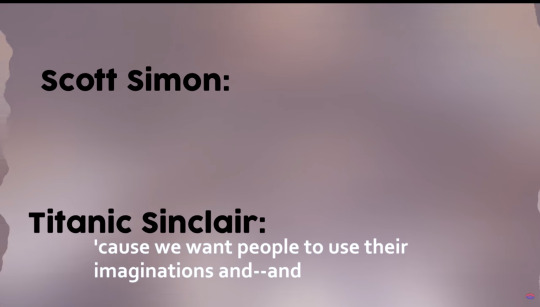
4. In an old interview (source), Titanic mentioned they like making content that puts people into a ‘Goldilocks’ zone, a balance between comfort and discomfort. I’ll focus on two reasons for this.
5. The first is to edge people out of the comfortable cycle of consumption. This forces people to take the art more seriously, to consider that it may have a higher purpose than just to provide a temporary sensation of pleasure.
6. The second is to give viewers the notion that this art might be criticizing something about them. People have a narcissistic tendency to avoid any kind of introspection, preferring instead to think, “oh, but this isn’t about me!”
7. By putting viewers just on the edge of their comfort zone, the content has a better chance of getting past their walls. Now it can reveal something about viewers that they otherwise wouldn’t have considered.
8. Some people may think Poppy’s VR videos are gimmicky, but the immersive nature of VR means that it’s a great medium for art that seeks to challenge viewers and force them to reconsider the nature of their own actions.

9. With this in mind, let’s get into the video. Poppy enters, looking like a mother crow with her entrails strung out. Note that her choice of costume is no accident. Things get weirder when she starts talking.
10. We get lines like: “I’ve touched so many people on the internet” and “I like when you are touched by me.” The implications of innuendo are absolutely intentional, and work to build discomfort in the viewers.
11. With the line: “Now it’s your turn,” Poppy takes these uncomfortable implications of Poppy violating fans and reverses them, implying now that the viewers are about to violate her. This is genius. Yet, somehow, it gets even better.

12. As the man-hands extend, the music increases in pitch, building the tension. We’re also hit with the line: “Anything is possible in virtual reality.” Viewers think: “wait, what does she mean by ‘anything’?”
13. These are probably Titanic’s hands, we should ask: why? Lots of Poppy fans are girls, right? Exactly, it’s part of the art. These aren’t your hands, they’re the hands of a nondescript white guy. You’re playing as him. And he’s about to touch Poppy.
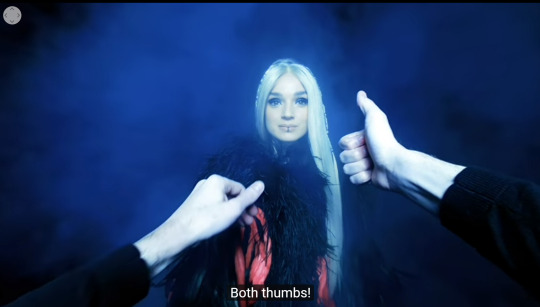
14. After Poppy is prodded with one hand, she cheerfully orders: “Now with this hand!” Then, Poppy childishly says: “Give me some thumbs up!” Not only is the viewer forced to vicariously exploit her, they’re forced to enjoy it.
15. When Poppy asks: “Do you want to touch me again?” the thumbs are reluctant at first, but when Poppy probes with: “Yes?” it becomes clear that the reluctance was only barely containing a more ravenous, primal desire.
16. Poppy grants full permission with:“Go ahead!” The viewers are now absolved of any responsibility for their actions. They may do anything they wish to her. Reminds me of Rhythm 0 by Marina Abramović (NSFW).
17. As the hands stroke Poppy, she softly exclaims: “Virtual Reality!” as if to mockingly say: “consider the possibilities!”

18. After a short time, Poppy asks the hands: “Are you finished?” The hands back down. But what if they hadn’t? Note the almost claw-like form the hands take. Like they’re ready to grab hold of her and squeeze her and not let her go.
19. Next, Poppy says that she is finished too, that she and [her fans] are finished touching, that they have “completed the cycle.” This echoes from my Computer Boy post—artists ‘touch’ fans through their art, but fans ‘touch’ artists in a very different way.
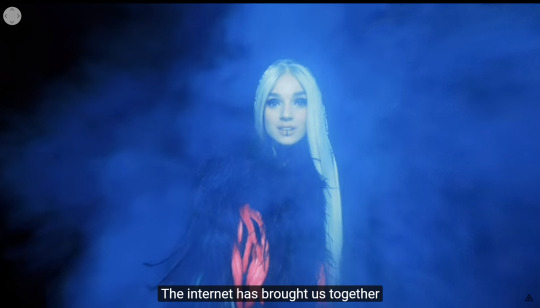
20. Last line: “The internet has brought us together.” Has it? It seems Poppy is sarcastic here. Is fueling fans’ obsession with artists by allowing them to spend all day fawning over the idol’s posts, pictures, and videos really bringing them together?
21. The brilliance of “Touch Poppy (VR 180 Experience)” comes from it challenging viewers to ask themselves: what’s really the difference between fondling Poppy in VR and fondling her in real life?
4 notes
·
View notes
Text
Concrete

“Concrete” - Reading #1
1. First, s/o to Poppy, Titanic Sinclair, Zakk Cervini, and Chris Greatti for putting this twisted track together. Get ready, I’m about to hit you with an interpretation nearly as insane as the song is.
2. Before descending, note that “Concrete” satirizes the hell out of pop music and pop idols. I mean, the catchy hook of the song is “Turn me into a street.” Like, that line throws some brutal shade on the vapidity of catchy pop lyrics.
3. With this in mind, “Concrete” isn’t a ‘don’t hate the player, hate the game’ sort of song, it’s more like a ‘I’m trapped here and I f*cking hate everybody’ sort of song. But don’t trip—“Concrete” is absolutely brilliant.
4. This is possibly Poppy’s most thematically obscure track, up there with Voicemail and X. Also, maybe her best song. Period. The best way I’ve found to understand it is to think of Poppy as playing two different characters.
5. The first character is that of a pop singer, much like herself, who is working within the music industry. The second character is that of the music industry itself, a small part of the larger whole that is the soul-crushing force of modernity.
6. Note: it’s not always clear what character she is playing. That’s because there is some overlap between the pop star (Poppy) and the music industry. Remember this—it’ll be important later.
7. The track opens with Poppy darkly demanding some entity to “bury [her] six feet deep, cover [her] in concrete,” and “turn [her] into a street.” There is a sentiment of wanting to be subsumed, and of wanting to ‘get it over with.’

8. The song then hits us with a cheery chorus, contrasting the eerie opening. Boom, clear character switch. Poppy is now playing the music industry.
9. Poppy compares the music industry’s incessant consumption of artists to some ‘thing’ gleefully gnashing human parts through its teeth (“Chewy, chewy, yummy, yummy, yummy/Sharp and pointy, yummy, yummy, yummy”).
10. However, we’re then hit with “Break me off a piece of that tasty treat,” which indicates we’ve switched characters again. Back to the pop star. Back to Poppy, who is essentially asking for a serving of people-soup.
11. Then we get “Sugar in my teeth,” signifying how this ‘food’ isn’t exactly healthy. Supporting this is “demons in my dreams/Watch me while I sleep for eternity,” which adds just a pinch of eternal guilt into the mix.
12. On the verse, Poppy continues playing the pop star, noting how traditional food items (candy, coffee, ice cream, tea) don’t satisfy her. These foodstuffs usually help many people ‘get through the day,’ giving them something to look forward to.
13. But Poppy rejects such treats. Instead, she only craves the taste of “young blood in her teeth.” No, Poppy is not saying she is a cannibal. To explain this line, we turn to the music video.
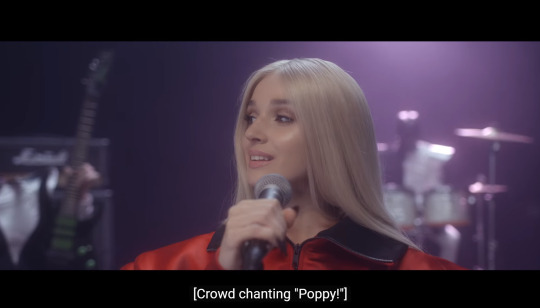
14. There’s a part in the MV where Poppy overlooks the crowd, basking in chants of “Poppy! Poppy! Poppy! Poppy!” She has acquired a new taste. Her wants have changed. She can no longer go back to the things that used to make her happy.
15. After this, Poppy goes back to pleading to the music industry to “bury [her] six feet deep, cover [her] in concrete,” and “turn [her] into a street.” Now we can revisit these lyrics with the rest of the song as context.
16. She is pleading to the industry to ‘finish her off,’ to drain the rest of her life-force and subsume her. She asks to be made into a “street,” another part of the system, just another cog in the wheel.
17. The idea of crushing assimilation is key here. Once consumed by the music industry, the artist becomes part of the apparatus (“Break me off a piece of that tasty treat”). She now helps perpetuate the music industry to consume and consume and consume and consume and consume...

18. We’re left with a very bleak picture of the pop star submitting to the music industry (blissfully digging her own grave in the MV) so she may be absorbed by a system that has built itself on the bodies of artists. A system that hungers endlessly… (music fades)
2 notes
·
View notes
Text
Computer Boy
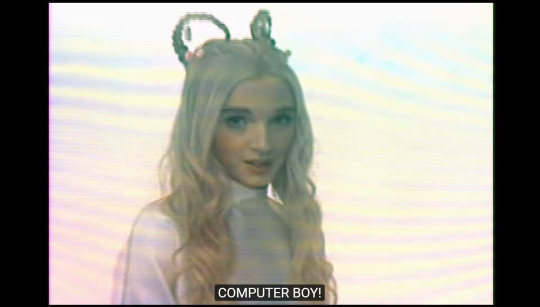
“Computer Boy” - Reading #1
1. Time to hit you with an extremely contentious reading of “Computer Boy,” so strap yourselves in. Also, this one might get me some flak. Please don’t take any of this personally, this is just for fun.
2. People typically think pop music is only meant to be “fun” or “catchy.” That it has nothing important to say, so you shouldn’t bother paying attention to the lyrics. These people are wrong.
3. I’m positive that Poppy and Titanic put a lot of effort into their work because they strive to make it into art, not just another product to be mindlessly consumed. I’m only hoping I can do such an effort justice.
4. A common reading of “Computer Boy” is that the song mocks people who are too attached to their technology. It does that by pointing out the absurdity of falling in love with a laptop. Sure, I agree, but I think that’s pretty surface-level. This reading is much zanier.

5. In the “Computer Boy” music video, the camera starts focused on Poppy singing away as two people hold a TV screen in the background. On the screen is a soulless blue face AKA Computer Boy. Then something weird happens:

6. The perspective switches. You are now viewing Poppy from inside the screen. For later, note that she alternates between ignoring you and staring into your soul. The message is clear: that soulless blue face? That’s you. You are Computer Boy.
7. You have been placed in the role of the spectator. Or, rather, reminded of your place. But now instead of the fan adoring the idol, the idol adores the fan. And it’s completely absurd.
8. Make no mistake, Poppy and Titanic know what they’re doing. They have ingeniously dissected fan infatuation by flipping the roles of the fan-idol relationship, exposing the absurdly lopsided nature of the pairing.
9. See, once an artist grows to a certain size, it becomes impossible to reciprocate affection in a proportionate way. The fans must be reduced in stature by technology so that the fanbase is manageable.
10. Soon, the only conception artists have of their fans is through social media metrics such as number of likes, number of views, number of subscribers, etc. The fans are no longer people to the artists, they are numbers.
11. Whoa, hold up. I am in no way saying Poppy doesn’t care about her fans. That’s demonstrably not true. I’m saying she is highlighting the insanely unbalanced nature of the fan-idol relationship through “Computer Boy.”
12. Look how she dresses in the MV. Plain white clothing. Pure. Her hair in an crown-like shape. Royalty. All of which demonstrates how fans see their idols—as almost angelic beings. Now, imagine if such an angel was in love with you.
13. Intoxicating, right? Also, totally impossible. Fans may obsess over their idols all day, listening to their music, watching their videos, and fawning over their pictures. They might even spend hours watching concert videos. Believe me, am/been there.
14. However, idols can’t spend even remotely the same amount of time obsessing over their fans. Remember, the main way most idols conceptualize their fanbase is through social media metrics.
15. “Computer Boy” is also a powerful reminder that the fan-idol relationship is increasingly mediated through the screen of social media and technology.
16. Poppy points all this out and more in “Computer Boy,” where she breaks down the fan-idol relationship by flipping it on its head.
17. She illuminates the obsessive nature of fandom through lines like: “I don’t want anybody else,” “Don’t ever leave me or go to sleep without me,” and “Please stay by my side forever and never talk to anyone else.”
18. I mean, check out Poppy’s stare at the end of the MV. She’s saying, “this is you,” but also, “this is you.” Don’t get it? You will.
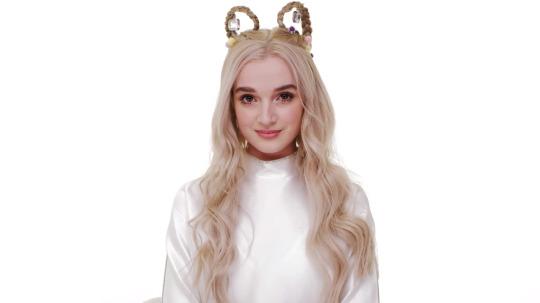
19. Conversely, she acknowledges the (sometimes sexual) desire that idols cultivate in their fans with lines like: “I’m in love with my favorite toy” and “I smile at him while I turn him on.” See also: the voyeuristic downward shots of Poppy’s legs in the MV.

20. “You didn’t crop out the black borders!” No, it was shot like that for a reason.
5 notes
·
View notes
Text
Hard Feelings

“Hard Feelings” - Reading #1
1. First, gushing: “Hard Feelings” is stupidly underrated. It’s a beautiful estuary that connects all the themes and sounds of AIAG. I’m surprised nobody is talking about it. Guess I’ll start.
2. Second, more gushing: seriously, I have no idea how Poppy & Co. were able to pack so much thematic depth into “Hard Feelings” while still making it such a beautiful track.
3. The song supports so many readings due to its indirect and ambiguous nature; there are many ‘hinge’ lines that can single-handedly alter an entire reading.
4. The instrumentals of “Hard Feelings” might be the freshest on AIAG. Functionally, they tie together the electronics of P.C, the poppy synths of early AIAG, and the heavy guitar riffs of late AIAG and beyond.
5. "Hard Feelings" also elegantly ties in elements of robotics from P.C as well as elements of gender and identity questioning from AIAG.
6. In the lyrics, Poppy questions the origins of her persona. To what degree is she (Poppy) a response to MA? Was she made purely to ‘get back’ at MA? Can she shake free from the spite, or is it too deeply imbedded in her character?
7. We're hit with the lines: "Someone you made me to replace/Someone you made–," where Poppy questions whether she is just a replacement for a failed experiment. She wonders what effect this has on the actions asked of her (“What crimes will you make me commit?”).
8. The song also touches on the woes of idolism with: “If I can never love, why do I have hard feelings?” Being an idol, especially one with such an iconic role as Poppy, means that any sort of public relationship is out of the question.
9. Consider the cult-like nature of the Poppy fandom, with her as the otherworldly figurehead. Any affair would expose her humanity, something that everyone is aware of, but chooses to suspend their belief of. Plus, imagine the scrutiny of the spotlight.
10. The lines: "My legs and my arms are so stiff/Is that the way you wanted it?" discusses the restrictive nature of being an idol. Fans want to meet their idol, not just another person.
11. However, Poppy is not absolved of all responsibility. Surely others may have influenced her participation, but they did not wholly force it. She plays Poppy, and the actor brings the character to life.
12. “Hard Feelings” encapsulates the feeling of being trapped in a costume that you helped create. Knowing this, "Hard Feelings" serves as Poppy's open letter to herself. A sort of: "what have I done?"
13. We can clearly see that playing such a character has taken a toll on Poppy ("you got my circuitry bleeding") and at points she struggles to separate the image from the real ("Am I a man or machine?").
14. Considering all of the above... I can only imagine how cathartic creating "Hard Feelings" must have been for her.
15. The song features Poppy confronting the artificiality of her persona and how it has affected her. This recognition and confrontation allows her ‘shed her skin’ so to speak. Meaning: “Hard Feelings” allows Poppy to discuss the grip of her persona, and thus, escape it.
2 notes
·
View notes
Text
X

“X” - Reading #1
1. “X” is one of Poppy’s most lyrically complex songs. No, seriously. I’ll explain. The song is chocked full of perspective switches and non-sequiturs. It’s hard to interpret this in a normal way, so we won’t.
2. Instead, we will focus on the tension that Poppy introduces with “X”: the tension between two primal urges: one desires order and peace, one desires chaos and violence.
3. To reconcile the multiple perspective switches, we can think of Poppy as singing from the perspective of someone who has forsaken their agency and submitted themselves to being caught in the maelstrom that embodies the eternal conflict between order and disorder.
4. In “X,” Poppy delivers these beautiful, melodic verses divided by what almost appear as complete lapses in control as she screams for some force to “get [her] bloody.” Note that in neither of these contrasting stanzas does the speaker have any agency.
5. She is pleading to some unknown entity for structure, and to another for anarchy. In neither case does the individual survive. In both cases she must forsake her sense of self, her control over her own life, over her own urges.
6. The speaker has resigned control. She’s given it to some other entity or force. In one instance, she abandons her self to the crushing rigor of organized civility, in the other, the unruly will of the bloodthirsty mob.
7. Again, nowhere in these lyrics does the speaker have a shred of agency. See lyrics like, “Please take me back to where we began,” “please get me bloody,” and “Please make me believe in harmony.”
8. This conflict is most notable in the poetry/ecstasy conflict that Poppy introduces. In a sense, poetry contains passion. It both communicates passion and restrains it. Ecstasy, however, is primal passion set free—and letting such volatile a thing as passion loose is dangerous.
9. Another way of describing this passion may be people’s feelings toward the news. People claim they want peace and happiness for others, and maybe they do. However, they also are addicted to the intoxicating nature of conflict, as reported by [news source of their choosing].
10. Nobody desires a predetermined life, nor do they wish for everlasting war. We all fall somewhere on the spectrum between order and disorder.
11. Poppy also floats the idea that no matter what, you can never fully free yourself of external forces. Most illustrative of this is the line: “You can get down on your knees if you’re naughty.” Only when you are “naughty” may you “get down on your knees.”
12. Even by breaking the rules you are only opening yourself up to another entity to submit to. In this case: the unrestrained will, either the will of the individual, or the will of the mass movement.
13. “X” is a clever way to introduce this eternal tension between control and disorder, but it is also a beautiful way for Poppy to transcend the structure of pop music by unleashing her experimental nu music.
4 notes
·
View notes